





19TH ASIA SECURITY SUMMIT SINGAPORE, 10–12 JUNE 2022







19TH ASIA SECURITY SUMMIT SINGAPORE, 10–12 JUNE 2022
19TH ASIA SECURITY SUMMIT SINGAPORE, 10 12 JUNE 2022
Arundel House | 6 Temple Place | London | wc2r 2pg | UK
www.iiss.org
© September 2022 The International Institute for Strategic Studies
Director-General and Chief Executive Dr John Chipman
Editor James Crabtree
Contributors Ben Barry, Nick Childs, Aaron Connelly, Dr NigelGould Davies, Franz-Stefan Gady, Dr Bastian Giegerich, Dr Tim Huxley, Yuka Koshino, Dr Lynn Kuok, Ithrana Lawrence, Meia Nouwens, Sarah Raine, Dr Ben Schreer, Kai-Lin Tay, Cherry Zheng
Editorial Ben Ho and Adam Walters
Production and Design Jade Panganiban, Kelly Verity, Loraine Winter
Printed and bound in Great Britain by Hobbs the Printers Ltd, Hampshire.
The International Institute for Strategic Studies is an independent centre for research, information and debate on the problems of conflict, however caused, that have, or potentially have, an important military content. The Council and Staff of the Institute are international and its membership is drawn from over 90 countries. The Institute is independent and it alone decides what activities to conduct. It owes no allegiance to any government, any group of governments or any political or other organisation. The IISS stresses rigorous research with a forward-looking policy orientation and places particular emphasis on bringing new perspectives to the strategic debate.
All rights reserved. No part of this book may be reprinted or reproduced or utilised in any form or by any electronic, mechanical, or other means, now known or hereafter invented, including photocopying and recording, or in any information storage or retrieval system, without permission in writing from the Institute.
Foreword 5
Introduction 7
Chapter 1 Keynote address 13
Chapter 2
First plenary session
Next steps for the United States’ Indo-Pacific strategy 19
Chapter 3
Second plenary session
Managing geopolitical competition in a multipolar region . . . . . . . . . . . . . . . . . . . . . . . . . 25
Chapter 4
Third plenary session
Developing new forms of security cooperation 31
Chapter 5
Fourth plenary session
Military modernisation and new defence capabilities . . . . . . . . . . . . . . . . . . . . . . . . . . . . 37
Chapter 6 Special address 43
Chapter 7
Simultaneous special sessions
Session 1 Climate security and green defence . . . . . . . . . . . . . . . . . . . . . . . . . . . . . . . . . . . . . . . 48
Session 2
Myanmar: Finding a way forward . . . . . . . . . . . . . . . . . . . . . . . . . . . . . . . . . . . . . . . . . . 50
Session 3
Maritime security: From codes of conduct to crisis communication . . . . . . . . . . . . . . . . . . . 52
Chapter 8
Istana reception and dinner 55
Chapter 9
Fifth plenary session
China’s vision for regional order . . . . . . . . . . . . . . . . . . . . . . . . . . . . . . . . . . . . . . . . . . 59
Chapter 10
Sixth plenary session
Common challenges for Asia-Pacific and European defence 63
Chapter 11
Seventh plenary session
New ideas for securing regional security . . . . . . . . . . . . . . . . . . . . . . . . . . . . . . . . . . . . . 69
Chapter 12
The Southeast Asian Young Leaders’ Programme 75
Appendices
I. Selected digital engagement and media coverage of the 2022 IISS Shangri-La Dialogue . . . . . 82
II. Selected IISS publications . . . . . . . . . . . . . . . . . . . . . . . . . . . . . . . . . . . . . . . . . . . . . . . 93

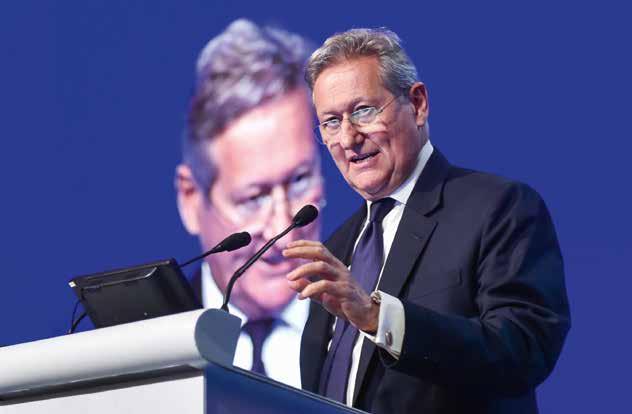
The International Institute for Strategic Studies (IISS) held its 19th annual Shangri-La Dialogue (SLD) in Singapore from 10 to 12 June 2022 after a two-year hiatus. We are pleased to present this report summa rising the Dialogue’s open proceedings, which include all of this year’s plenary and special sessions, as well as a section detailing the discussions of our Southeast Asian Young Leaders’ Programme (SEAYLP).
The strategic dynamic in the Asia-Pacific region has developed over the last year in ways that natu rally shaped the agenda of this year’s Dialogue, which opened with a keynote address by Japanese Prime Minister Kishida Fumio. The proceedings then included seven plenary sessions, providing defence ministers, senior officials, high-ranking military figures and other distinguished delegates with an opportunity to discuss critical developing security issues.
The 2022 Dialogue involved 553 delegates, around half of whom were from governments or armed forces. A total of 37 national delegations attended, with 32 defence ministers present. On the sidelines of the summit, many hundreds of bilateral, trilateral, mini lateral and multilateral meetings among government delegations took place, with IISS facilitating over 100 of them.
The Institute also hosted an opening ministe rial reception for national delegation leaders, while organising the important SEAYLP. This provided an opportunity for 41 young leaders from around the region to discuss pressing security questions in specially organised sessions, as well as playing a full part in the Dialogue’s broader debates.
This year’s Dialogue reflected a range of regional and global security concerns, and was set against the backdrop of Russia’s invasion of Ukraine, a topic addressed most directly in a special address that Ukrainian President Volodymyr Zelenskyy gave virtually from Kyiv.
The SLD agenda also included a plenary session on common challenges facing Asia-Pacific and European defence establishments. Elsewhere, our agenda focused on the developing security postures of both the United States and China; the challenges of geopolitical competition in a multipolar region; new forms of security cooperation; military modernisation and new defence capabilities; and new ideas for secur ing regional stability.
As ever, the IISS is grateful to the Singapore gov ernment for its support for the SLD process. This also includes the annual IISS Shangri-La Dialogue Sherpa Meeting, which was convened successfully in January 2022, and which will convene once again from 15–17 January 2023.
We would like to thank in particular the following lead commercial sponsors for their financial sup port for the IISS Shangri-La Dialogue: Airbus, BAE Systems, Boeing, Lockheed Martin and Raytheon Technologies. We also extend thanks to principal sponsors Babcock International Group, Microsoft, and Rolls-Royce, as well as main sponsors Asahi Shimbun, Leonardo, Maxar Technologies and ST Engineering. The Shangri-La Hotel generously sponsored the Dialogue’s opening dinner.
The IISS looks forward to developing these part nerships, and making new ones, with the shared aspiration of advancing regional security dialogue and cooperation through the SLD process in the years to come. We look forward to welcoming delegates in-per son to Singapore for the 20th IISS Shangri-La Dialogue from 2–4 June 2023.
Dr John Chipman CMG, IISS Director-General and Chief Executive James Crabtree, IISS–Asia Executive Director
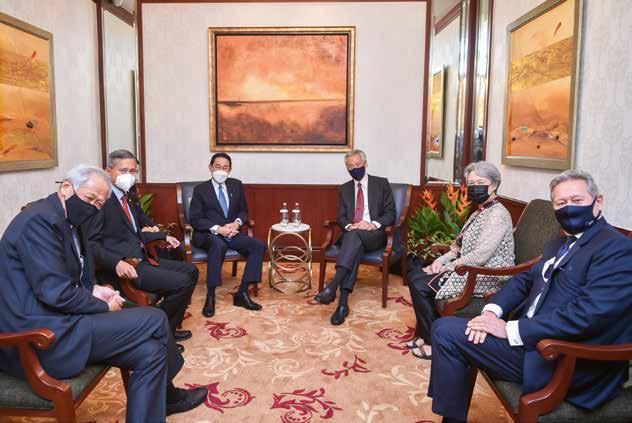
The 19th IISS Shangri-La Dialogue returned in 2022 following an enforced two-year absence due to the COVID-19 pandemic. The IISS convened the first SLD in 2002, and until 2019 ran the event each year with out interruption. Throughout that time, the Dialogue provided a valuable forum where members of defence establishments throughout the Asia-Pacific could come together with their peers from nations elsewhere in the world with security interests in the region, both to discuss pressing regional issues and attempt to solve complex security problems. The fact that the summit was not convened in the past two years and made its return this year all the more important. While interna tional diplomacy continued throughout the pandemic, many major international meetings moved wholly or partly online. The IISS has long believed in the central importance of physical meetings to constructive diplo macy, however. We were therefore pleased that this year’s Shangri-La Dialogue returned in its traditional in-person format.
The summit’s return was timely too, given a sharp deterioration in the regional security situation driven largely by rising geopolitical competition between the US and China. This year’s Dialogue was notable also for the prominence of discussions about Russia’s February 2022 invasion of Ukraine and its potential impact on the Asia-Pacific region. By convention, the Dialogue begins with a keynote address at the Friday evening opening dinner, and this year, Japan’s Prime Minister Kishida Fumio was the keynote speaker. In his remarks, Kishida summed up the concerns of many participants, noting the risks of Russia’s actions for the existing international order and also for Asian security. ‘I myself have a strong sense of urgency that Ukraine today may be East Asia tomorrow,’ he said. The impact of Russia’s actions was also visible in a
powerful special address delivered at the Dialogue by Ukrainian President Volodymyr Zelenskyy, who spoke virtually from Kyiv.
The Shangri-La Dialogue remains the only annual meeting that aims to bring together Asia-Pacific defence ministers with permanent heads of defence ministries and military chiefs. Originally known as the Asia Security Summit, the event has become widely recognised as a valuable meeting place for regional security leaders, as well as observers of regional security in the business, expert and media communities. Concurrent with the Dialogue, a paral lel meeting convenes intelligence chiefs from selected regional and extra-regional states. The IISS also ran its 5th Southeast Asian Young Leaders’ Programme, bringing together more than 40 mid-career profes sionals from around the region to play a full part in the Dialogue programme.
Over its two-decade history, the SLD has become part of the fabric of the Asia-Pacific’s security archi tecture. It provides regional governments with a public platform to explain their developing defence policies and identify developing issues of security concern. The Dialogue also allows senior regional defence leaders to develop and enhance coopera tion with one another, notably through the hundreds of bilateral and other meetings which occur on the Dialogue’s sidelines. This year saw notable exam ples of such meetings, not least the first bilateral meeting between US Defense Secretary Lloyd Austin and Chinese Ministry of National Defence Minister Wei Fenghe. Finally, the Dialogue aims to develop a sense of common community and focus among leaders from regional security establishments in the hope this might also provide space to move towards solutions to the many challenges the region faces.
Speaking in this year’s closing plenary session, Singapore’s Minister for Defence Dr Ng Eng Hen reflected on the place of the Dialogue for Asia-Pacific security and the success of this year’s event. ’Some of you have been at the Shangri-La Dialogue since its inception in 2002,’ he told his audience. ‘I think it would be fair to say that this one will be counted as unforgettable and unique,’ he added.
The IISS designs the SLD as an open platform for debate and discussion. Each year’s agenda is con structed to allow a fair reflection of the diversity of views and priorities of regional security estab lishments. There is no single overarching theme to the summit. Rather, the SLD agenda is constructed around a series of individually themed plenary ses sions which provide invited defence ministers with the opportunity to speak to a high-profile audi ence of fellow security decision-makers, experts, business leaders and media commentators. These themes reflect the Institute’s view of the most press ing emerging security challenges and themes for the region. This year, the Dialogue’s agenda also included three special sessions which provided the opportunity to address and discuss in a roundtable
format more specific regional security issues. Two themes were especially prominent during the 19th IISS Shangri-La Dialogue, namely rising Sino-US geopolitical competition and the regional impact of Russia’s invasion of Ukraine.
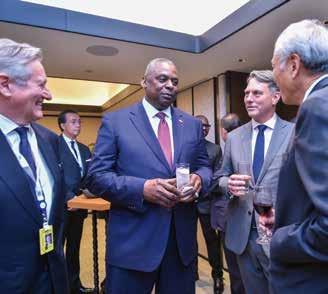
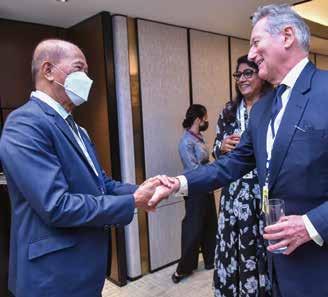
Russia’s invasion was referenced from the start of the Dialogue during Prime Minister Kishida’s key note address. ’As the world was still recovering from the pandemic, Russia’s aggression against Ukraine occurred,’ he noted. ’No country or region in the world can shrug this off as someone else’s problem. It is a situation that shakes the very foundations of the international order, which every country and indi vidual gathered here today should regard as their own affair.’ And during Zelenskyy ’s special address, the Ukrainian president argued that it is ’on the battlefield in Ukraine that the future rules of this world are being decided along with the boundaries of the possible’. Elsewhere, almost every plenary speech mentioned in one form or another Russia’s actions, and this under lines the common concern of sustaining international rules and order stretching from the Euro-Atlantic to the Indo-Pacific. The SLD agenda also included a plenary session titled ’Common Challenges For AsiaPacific And European Defence’.
Sino-US competition emerged as a clear theme through many plenary speeches, notably including
those of the ministers from China and the US them selves. Speaking on Saturday morning, Defense Secretary Austin laid out US priorities. ’We seek a region free of aggression and bullying,’ he said. ‘And we seek a world that respects territorial integrity and political independence, a world that expands human rights and human dignity, and a world in which all countries – large and small – are free to thrive and to lawfully pursue their interests, free from coercion and intimidation.’ The following morning, in a ses sion entitled ‘China’s Visions of Regional Order’, Minister Wei responded to Austin: ’China’s develop ment is not a threat to others. On the contrary, it is a big contribution to global peace and development.’ He added: ’No matter what stage of development it reaches, China will never seek hegemony or engage in military expansion.’ Numerous other speakers also made reference to the challenges of managing ongo ing tensions between China and the US, either openly or obliquely.
Elsewhere, the Dialogue covered a range of themes. There was a plenary examining ways to manage geo political competition in a multipolar region. There was a following session which noted that ties between Beijing and Washington are now defined by strate gic competition across numerous domains, raising concerns about potential future conflict. The wider region is multipolar in nature, however, with middle and smaller powers playing important roles helping to manage and respond to this atmosphere of com petition. The third plenary covered new forms of security cooperation, with a particular focus on new relationships like the Quad, AUKUS as well as existing regional forums such as the ASEAN Defence Ministers Meeting Plus (ADMM+) grouping in Southeast Asia. Discussions also focused on military modernisation and new defence capabilities, noting the significant wave of military modernisation underway across the Asia-Pacific, as both China and the US invest in improved military postures and a range of middle powers develop new defence capabilities such as hypersonic missiles and nuclear-powered submarines.
The Dialogue closed with a plenary examining new ideas for securing regional stability. Given rising security competition across the Asia-Pacific, speakers
examined what might be done to decrease tensions and manage potential flashpoints, including the prospect of new ’guardrails’ to manage geostrategic competition, including bilateral crisis communication channels and cooperation on public goods, such as in the maritime sphere.
On Saturday afternoon, IISS senior staff chaired three special sessions delving into more specific con temporary security challenges. The first focused on climate security and green defence, noting that climate change will have a substantial impact on Asia-Pacific security, both by exacerbating existing regional ten sions and creating new areas of contention, while rising sea-levels will directly affect defence institutions, in particular by jeopardising military facilities in coastal or island locations. The second special session exam ined potential ways forward in the ongoing conflict in Myanmar since the February 2021 coup d’état, noting that both armed conflict and humanitarian crises have spread to every corner of Myanmar, while ASEAN has so far struggled to make progress in the implementation of its Five-Point Consensus. The final special session examined maritime security. It covered major regional powers maintaining blue-water navies to project power and influence. It also noted that cooperation between maritime states remains integral to preserving regional stability at a time of rising geopolitical competition.
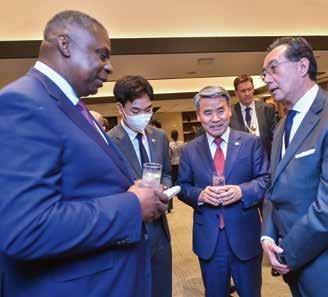
The 19th Shangri-La Dialogue returned in near-normal conditions, albeit with carefully targeted COVID 19 safe-management measures to ensure the well-being of all delegates. The summit also returned to around the same size as in prior editions, with 553 delegates attending, around half of whom were senior officials and military leaders.
From its earliest days in 2002, the Dialogue has been structured around a core group of regularly par ticipating nations. In 2022, of the 27 regular participant countries represented at the Dialogue, 18 sent del egations led by full ministers: Australia, Bangladesh, Brunei, Cambodia, Canada, China, France, Indonesia, Japan, Malaysia, New Zealand, Philippines, Republic of Korea, Singapore, Sri Lanka, Timor-Leste, the US and Vietnam. Other high-ranking officials, including defence chiefs and military personnel, led delega tions from the European Union, Germany, India, Laos, Pakistan, Switzerland, Thailand and the United Kingdom. Ministers from four other countries also participated, namely Fiji, Qatar, the Netherlands and Solomon Islands. In total, the IISS this year welcomed representatives from ten guest governments, on top of our regularly participating nations. The Dialogue is also an important gathering place for international institutions, with ASEAN, the EU, the International Committee of the Red Cross, NATO, the Pacific Fusion Centre, the United Nations and the Five Power Defence Arrangements represented this year.
Strong levels of participation from regional defence ministers were well received in this year’s Dialogue. The continued participation of both China and the US was especially welcome. The US defence secretary has spoken at every SLD since its inception. Secretary Austin’s attendance this year demonstrated continued US commitment both to the region in gen eral and the SLD process in particular. Meanwhile, China first sent official representation to the Dialogue in 2007, and in recent years, including 2019, had sent a delegation led by Minister of National Defence Wei, who is also state councillor. General Wei’s role this year leading China’s delegation and speaking in the fifth plenary session demon strated Beijing’s continued willingness to engage at
the highest level in the Shangri-La Dialogue, and to use the event as one of Beijing’s most prominent forums for regional diplomacy.
The 19th SLD also notably provided platforms for a number of newly appointed ministers. We were pleased to welcome a number of defence ministers attending for the first time, including: Canada’s Anita Anand; France’s Sébastien Lecornu; South Korea’s Lee Jong-sup; Australia’s Richard Marles; and the Netherlands’ Kajsa Ollongren. At a time of rising inter est in the security of the Pacific, the Dialogue this year was pleased to have especially strong representation from smaller island nations around the Asia-Pacific, including Maldives’ Defence Minister Mariya Ahmed Didi; Inia Batikoto Seruiratu, Fiji’s Minister for Defence, National Security and Policing, as well as Minister for Rural and Maritime Development and Disaster Management; and Anthony Veke, the Solomon Islands’ Minister of Police, National Security and Correctional Services.
Defence ministers and senior military leaders around the region have long used the SLD as a venue for private bilateral, trilateral and multilateral meet ings. In 2022, the Dialogue hosted many hundreds of such gatherings in the Shangri-La Hotel, more than one hundred of which were directly facilitated by the IISS itself. The details of these meetings remain confidential.
The IISS Shangri-La Dialogue
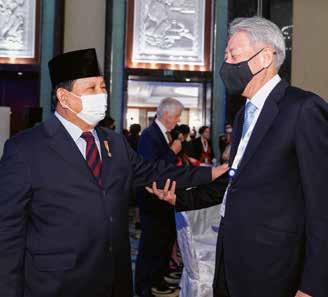
Nevertheless, many of the meetings do often become public, like the one between the US and China. Various other significant meetings occurred during this year’s Dialogue, including China’s meeting with defence ministers from attending ASEAN nations. Australia’s Marles also met with his French counterpart Lecornu, the first time the two nations had met at that level since disagreements over Australia’s decision to join AUKUS in September 2021. In addition, Marles met China’s Wei, restarting a defence dialogue at the min isterial level between the two nations after a number of years of strained ties.
The IISS Shangri-La Dialogue is primarily a TrackOne meeting where speaking roles are given to government figures and whose focus remains on facil itating intergovernmental diplomacy. Nonetheless the Dialogue also brings together a large number of highlevel non-government participants, including senior business figures, leading regional experts and select media commentators. This year, in particular, we welcomed more than 90 expert delegates drawn from mostly the academic and think-tank communities, as well as 22 media delegates. Elsewhere, the SLD played host to 200 further members of the media represent ing 60 news organisations from across the world. Overall, the delegate male-to-female ratio at this year’s Dialogue was around three to one. However, the
gender balance amongst the experts and researchers we invited as delegates was 45% female and 55% male, while the delegate composition of SEAYLP was split almost exactly 50/50 between the two genders.
Speaking in the final plenary session of this year’s Shangri-La Dialogue, IISS Director-General and Chief Executive Dr John Chipman noted another impor tant theme of the event: ’Throughout this Shangri-La Dialogue I think every single speaker in their own ways has mentioned the importance of adherence to a rules-based order.’ He added: ‘But there remain questions still about how to deter their breach, how to defend against their rupture and how to reverse the effect of their sometimes-savage violation?’ The IISS looks forward to discussing these and other ques tions as we move forward rapidly to organise the 20th Shangri-La Dialogue, which will be held in Singapore from 2–4 June 2023. In preparation, from 15–17 January 2023, we will also hold the 11th Shangri-La Dialogue Sherpa Meeting, which will convene in Singapore senior defence officials and military offi cers from participant countries to discuss the region’s developing security issues and shape the agenda for the next Dialogue.

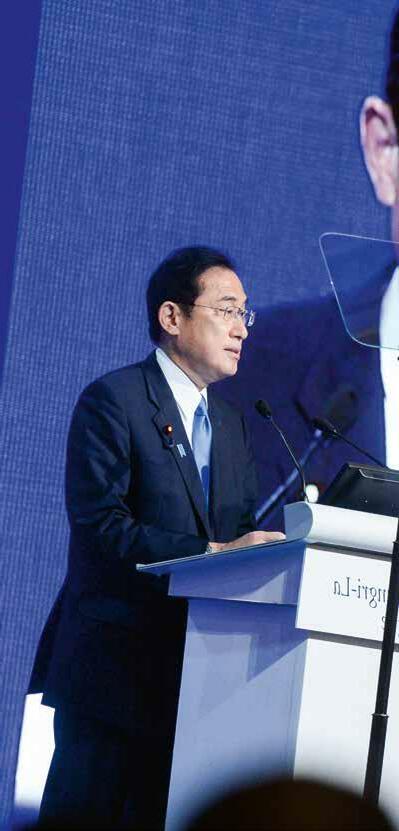

19TH ASIA SECURITY SUMMIT SINGAPORE, 10–12 JUNE 2022
Friday 10 June 2022, 20:00
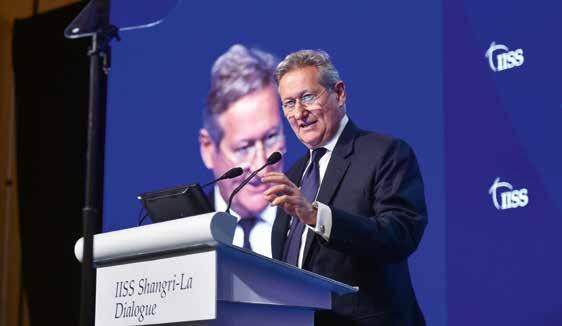
Introducing the keynote address, IISS Director-Gen eral and Chief Executive Dr John Chipman noted that Japan’s Prime Minister Kishida Fumio could speak with ‘unique authority’ on the links between European and Asian security given his ‘long period of success’ as foreign minister. As prime minister, Kishida has been ‘especially active on questions of international rela tions and strategy’.
Opening his address, the prime minister said that he wanted to share his view of ‘the current severe situ ation facing the international community’, which is standing ‘at a historic crossroads’, the most important since the end of the Cold War. Kishida noted that the COVID-19 pandemic has produced a ‘more uncer tain’ world. Russia’s ‘aggression against Ukraine’, he said, is shaking ‘the very foundations’ of international order. In the South China Sea, there is no compliance with international law, while ‘unilateral attempts to change the status quo by force’ continue in the East
China Sea. Other challenges include maintaining peace and stability across the Taiwan Strait; North Korea’s nuclear and missile activities in violation of UN Secu rity Council resolutions; and the ‘abductions issue’.
Noting that Japan is the world’s third-largest economy and has ‘consistently’ sought to foster peace and prosperity in the region since 1945, Kishida said that it has a heavy responsibility. Japan should focus on upholding ‘universal values’, and he is committed to ‘realism diplomacy’ based on pragmatism. Japan would be ‘more proactive than ever’ in the face of international challenges. Specifically, the prime min ister said he would ‘advance the Kishida vision for peace’ and strengthen Japan’s regional diplomatic and security role through five ‘pillars’.
Addressing the first of these, Kishida said it is imperative to ‘press forward in maintaining and strengthening the rules-based free and open inter national order’ based on the rule of law, peaceful
resolution of disputes, non-use of force and respect for sovereignty. He highlighted freedom of navigation, free trade, respect for human rights and democratic political systems as important components of such an order. Japan, Kishida stressed, promotes the Free and Open Indo-Pacific (FOIP) idea which has gained ‘broad support’ internationally. The prime minister mentioned that the US, Australia, India, the Euro pean Union and several European states all share ‘a common grand vision’ of FOIP.
Stressing that collaboration with ASEAN – with its own Outlook on the Indo-Pacific vision – is ‘absolutely essential’, Kishida mentioned his visits since becoming prime minister to several Southeast Asian countries and his wish to ‘deepen discussions’ with them on ensuring regional peace and prosperity. Pacific Island countries are also important, he said, as parties in real ising FOIP. Japan would assist them in addressing the ‘existential challenge of climate change’ as part of its contribution to their ‘sustainable and resilient eco nomic development’.
Kishida emphasised FOIP cooperation being built on ‘long-standing trust’ and not limited to infrastructure construction – it also focuses on developing human resources, promoting ‘autono mous and inclusive development’ and fostering inclusivity. The Quad – involving Australia, India, the US as well as Japan – is also promoting FOIP
through large-scale infrastructure assistance and investment. Japan is ‘beefing up’ its diplomacy in support of enhanced FOIP cooperation, notably through increased official development assistance.
Kishida said he would set out a FOIP ‘plan for peace’ by early 2023, including providing patrol vessels and enhancing maritime law-enforcement capabilities as well as cyber and other initiatives. Japan, he revealed, is using advanced technologies to strengthen its maritime-security efforts. Over the next three years, it would boost the maritime law-enforce ment capabilities of ‘at least 20 countries’. This would include providing patrol vessels and developing mari time-transport infrastructure.
The second pillar of the prime minister’s vision focuses on enhancing security. Kishida said that ‘Ukraine today may be East Asia tomorrow’. Japan is united with the international community in impos ing sanctions on Russia while supporting Ukraine. He said he would seek ‘a stable international order’ through ‘dialogue, not confrontation’, while enhanc ing Japan’s ‘deterrence and response capabilities’. Kishida’s government would set out a new nationalsecurity strategy by the end of 2022 with the intention of fundamentally reinforcing Japan’s defence capabili ties and substantially increasing the defence budget. No defence options, including ‘counter-strike capabili ties’, would be ruled out.
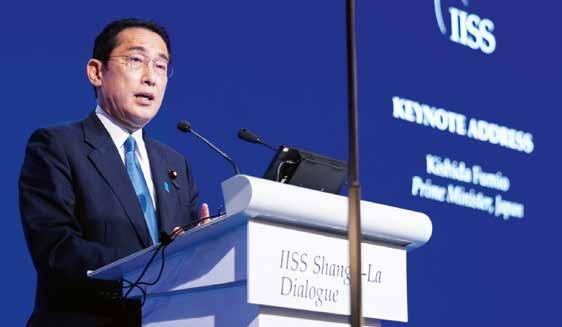
Kishida then emphasised the importance of ‘mul tilayered security cooperation’. The Japan–US alliance is the ‘linchpin’, said Kishida, adding that when US President Joe Biden visited Japan in May 2022, Wash ington and Tokyo fully agreed on expanding and deepening bilateral security and defence coopera tion. Kishida asserted that the Japan–US alliance has become the cornerstone of peace and stability in not only the Indo-Pacific but also ‘the entire world’. Japan would also promote security cooperation with Aus tralia and ‘other like-minded countries’, he revealed.
Kishida noted that he is concluding negotiations with Singapore on a defence-equipment-and-technol ogy transfer agreement and is continuing efforts to establish similar arrangements with other Southeast Asian countries. Japan has also signed a Reciprocal Access Agreement with Australia, agreed in principle another such arrangement with the UK, and would seek more with counterparts in Europe and Asia. A Japanese Maritime Self-Defense Force flotilla led by a destroyer would begin a regional cruise on 13 June and exercise with other Indo-Pacific navies.
Moving on to the third pillar of his ‘vision for peace’, Kishida said that Japan would do its ‘utmost’ to achieve a world without nuclear weapons. Noting the current discussion about Russia’s potential use of such arms and speaking as leader of ‘the only country that has suffered the devastation of atomic bomb ings’, he said that the ‘threat of nuclear weapons, let alone the use of them’ should ‘never be tolerated’. The prime minister said that Russia’s threat of nuclearweapons use may have seriously damaged the non-proliferation regime, possibly provoking further nuclear proliferation. Japan also has ‘great concerns’ over another North Korean nuclear test. Meanwhile, a ‘return to compliance’ with the Iran nuclear agree ment has not happened.
Even as the path to a nuclear-weapons-free world has become ‘even more challenging’, Kishida said Japan would present a roadmap on this issue with greater transparency regarding nuclear forces as the first step. Japan would also encourage dialogue between the US and China on nuclear disarmament and arms control. He noted the importance to bring back discussions on the Nuclear Comprehensive Test
Ban Treaty and Fissile Material Cut-Off Treaty, and to maintain and strengthen the Non-Proliferation Treaty (NPT). Japan would work to ensure a substantial out come to the NPT Review Conference in August 2022. It would also establish a Group of Eminent Persons for a World without Nuclear Weapons, which would meet in Hiroshima during 2022. Regarding North Korea, Kishida underscored Japan’s resolve to work closely with the US and the Republic of Korea towards com plete denuclearisation.
Kishida asserted that reform of the United Nations is urgent. Although Russia’s ‘outrageous act’ has caused the UN to face ‘a time of trial’, the importance that Japan attaches to the international body remains unchanged. UN reform would not be easy, but Japan would lead discussions on strength ening UN functions including reform of the Security Council, which it would join (as a non-permanent member) in 2023.
Finally, the prime minister discussed international cooperation in new policy areas, including economic security. The COVID-19 pandemic and the ‘aggression against Ukraine’ have highlighted the need for eco nomic resilience. Japan has enacted Economic Security Promotion legislation, but international cooperation is also ‘essential’, notably through ‘frameworks of likeminded countries’. Japan’s economic status, Kishida said, confers responsibilities as well as benefits: economic cooperation and financing must be ‘charac terised by transparency’.
Japan would promote economic cooperation based on human security and ‘respecting the ownership of each country’. ASEAN and the Indo-Pacific region ‘must remain the growth engine of the world, and Japan would ‘contribute to building resilient nations’. Concluding, Kishida stressed that the ‘vision of a rules-based free and open international order’ that he shared is ‘one in which we all work together’ towards the objective of a ‘future of peace and prosperity’.
Following Prime Minister Kishida’s address, Yuka Koshino, IISS Research Fellow for Security and Tech nology Policy, asked what contemporary ‘realism
The IISS Shangri-La Dialogue
diplomacy’ would be involved in relation to China. Kishida replied that Japan’s relations with China are important for the region and the international com munity. He said that Japan had asked China to ‘act responsibly and…build a constructive and stable rela tionship’. President Xi Jinping agreed with him that China and Japan need to ‘work mutually’ to create such relations. But Kishida also noted there are ‘many issues pending’, and both sides need to enhance mili tary transparency to foster trust and confidence.

Lieutenant-General (Retd) He Lei from the Chi nese People’s Liberation Army (PLA) asked about Kishida’s ‘major vision’ for the Sino-Japanese rela tionship. The prime minister replied that the two countries’ bilateral relationship has a ‘major impact’ on global peace and prosperity. There are ‘complex issues’ involving the two countries, but he and Xi have agreed on developing a ‘constructive and stable rela tionship’. Communication and dialogue need to be enhanced at all levels to build trust, Kishida observed.
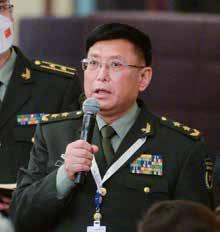

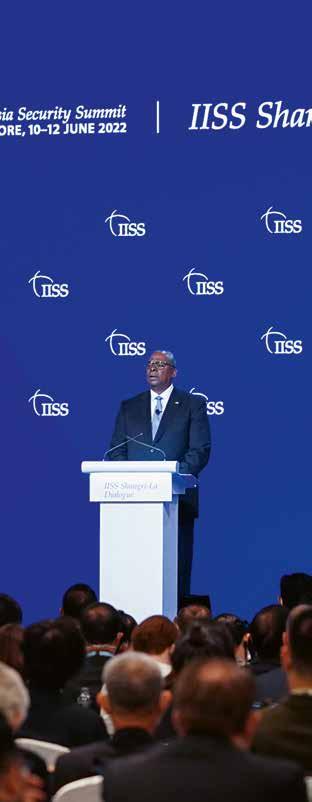

19TH ASIA SECURITY SUMMIT SINGAPORE, 10–12 JUNE 2022
Saturday 11 June 2022, 08:35
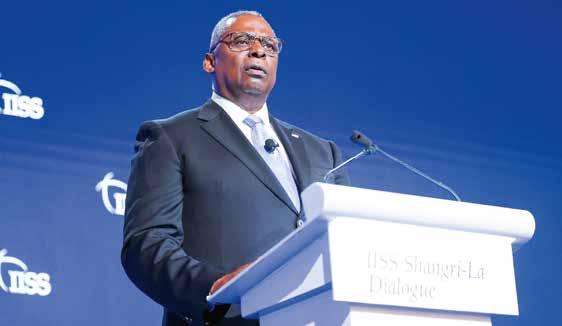
US Secretary of Defense Lloyd J. Austin III began by illustrating that the US is ‘deeply committed’ to help ing the world move past the COVID-19 pandemic globally, highlighting US vaccine contributions of more than US$19 billion worldwide since March 2020. He further highlighted US commitment to help the Indo-Pacific region ‘heal, recover and rebuild’.
Austin drew attention to the inaugural US–ASEAN Special Summit held in Washington the previous month, where US and ASEAN partners declared commitments to principles of ‘an open, inclusive and rules based regional architecture’. Austin added that Quad leaders importantly echoed these principles two weeks later. He underscored that the challenges the region faces – from cyber and nuclear proliferation to attempts to carve up regional spheres of influence –require ‘shared responsibility and common action’ to ‘uphold international law’, ‘defend global norms’ and ‘oppose unilateral changes to the status quo’.
Austin described US commitment to the security and prosperity of the Indo-Pacific as ‘the core organis ing principle of American national security policy’. He also stressed that the region is at the ‘heart of Ameri can grand strategy’ as visits from senior American officials, including President Biden, in the previous month exemplified. Austin observed that the princi ple of the Indo-Pacific as America’s ‘centre of strategic gravity’ would be central to the forthcoming National Security Strategy and National Defense Strategy.
Austin described the Russian invasion of Ukraine as a ‘historic crisis’ that has deep implications for the rulesbased international order and state sovereignty. He also noted that US allies and partners in the Indo-Pacific understand the importance of the ‘rules-based inter national order’, and that smaller states have a ‘right to peacefully resolve disputes with their larger neighbors’ given the amount of security assistance and humanitar ian aid that the Indo-Pacific has ‘rushed’ to Ukraine.
Pacific and strengthen security in the region, with more than 300,000 US military members stationed there. President Biden’s Fiscal Year 2023 included the ‘largest investments in history to preserve the region’s security’, such as US$6.1bn for the Pacific Deterrence Initiative.
Austin further sought to emphasise that US secu rity alliances and partnerships in the Indo-Pacific constitute a ‘profound source of stability’ and that Washington would ‘remain unwavering in its mutualdefence commitments’. While integrated deterrents in the region would continue to be focused on ‘proud treaty allies’, the US would also seek closer ties with India and increase defence cooperation with partners such as Indonesia, Singapore and Vietnam. In this vein, Austin highlighted three ways where the US has been working with regional states.
Firstly, the US has been working with allies to ensure they have the ‘right capabilities’ to protect their interests and defend against aggression. This involves linking US and its allied defence-industrial bases, integrating their supply chains and co-pro ducing some key technologies. Austin illustrated that the US seeks to share research-and-development advances with allies, citing the AUKUS alliance as an important example for cooperation in emerging
technology research. In addition, the Indo-Pacific Economic Framework, recently launched by Presi dent Biden with 12 partners from across the region, was referred to as a medium for developing secure supply chains for critical technologies.
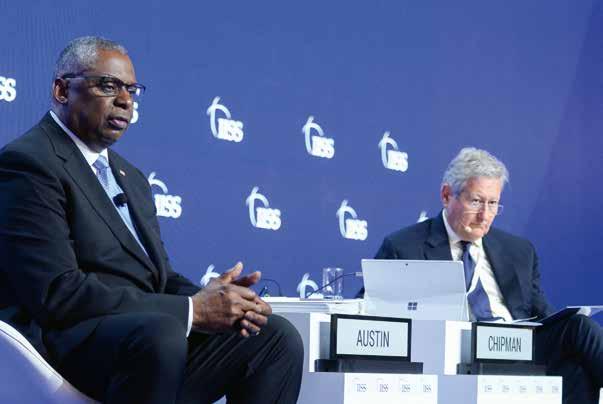
Secondly, the numerous bilateral and multilat eral military exercises the US conducts with regional allies were emphasised as key means through which common readiness and deeper interoperability are fostered, helping to deter aggression. In particular, Austin shared that these exercises would be expanded to include counter-grey zone operations in coopera tion with the US Coast Guard, while acknowledging the presence of US Coast Guard Commandant Admi ral Linda Fagan at the Shangri-La Dialogue for the first time.
Thirdly, US efforts to deepen and develop inno vative means of cooperation with allies to enhance regional security were addressed. Austin’s presence at the ADMM+ and the Indo-Pacific Partnership for Maritime Domain Awareness were named as relevant examples of US efforts in driving new forms of secu rity cooperation in the region.
Austin sought to reassure that the US would stand by its allies in the face of aggression. In reac tion to the North Korea’s ‘persistent threat’, Austin noted that the US and the Republic of Korea will con tinue to strengthen their extended deterrence against
nuclear arms and ballistic missiles. Austin stressed that the US also stands by its allies in upholding their rights in the face of Chinese coercion over territorial disputes, such as in the South China Sea or at the Sino-Indian border. Expressing alarm at increasingly aggressive PLA activity in the region that endan gers both US and allied forces, Austin identified the Taiwan Strait as being an area where ‘the stakes are especially stark’.
Austin emphasised that US policy on Taiwan, guided by the One China policy and the Taiwan Rela tions Act, remains ‘unchanged and unwavering’. While the US will continue to fulfill its self-defence capabil ity commitments to Taiwan and opposes unilateral changes to the status quo, it does not support Taiwan ese independence. Stating that Washington does not seek confrontation in the region, Austin stated that the US will do its part to ‘manage tensions responsibly’, including by ensuring ‘fully open lines of communica tion’ with the PLA to avoid any miscalculations.
Austin concluded by acknowledging that the future of the Indo-Pacific is interconnected and inclu sive, with states working together in new and existing regional institutions without being forced upon binary choices. To achieve this goal, Austin called upon IndoPacific states to work together and demonstrate ‘the power of partnership’.
now closed as the result of the Ukraine war. Austin answered that while the military could add value to the situation in the Black Sea, he would always seek a diplomatic solution first, where he saw great effort already being invested.
Dr Chung Min Lee, IISS Advisory Council Chairman and IISS Trustee, asked what Korea, Japan, Australia and New Zealand could do to augment European security and vice versa. Austin replied that allies in the IndoPacific have already been very supportive of the effort in Europe and that there are great lessons to be learnt in terms of future commitments in Europe and Asia.
Bonnie Glaser, Director of the Asia Program at the German Marshall Fund, asked what steps the US would need to take to bolster deterrence to preserve peace and stability in the Taiwan Strait. To this, Austin reiterated that the US remains committed to providing Taiwan with the means to defend itself and high lighted that US policy on Taiwan remains unchanged.
Delegates raised a series of questions ranging from US response to the blockade on Ukraine grain and its possible strategies to increase deterrence in the Taiwan Strait, to its policy on Taiwan and the development of advanced military technologies.
Dr John Chipman, IISS Director-General and Chief Executive, asked whether the secretary sees a role for the military in supporting the flow of humanitarian aid and grain in the Black Sea given that the routes are
Dr Lynn Kuok, IISS Shangri-La Dialogue Senior Fellow for Asia-Pacific Security and Co-Editor of the Asia-Pacific Regional Security Assessment, asked whether the secretary was concerned that East Asia would also experience war as Ukraine and if so, whether such con cern was due to the general sense that war can occur anywhere or due to specific concerns about autocra cies such as China and Russia. Austin responded that ‘anything is possible’ and reiterated the importance of building the ‘right kinds’ of defence capabilities and adherence to the rules-based international order.
Franz-Stefan Gady, IISS Research Fellow for Cyber Power and Future Conflict, asked regarding the types of game-changing technologies that Austin had referred to and how these will impact the US force posture in the region in the near to medium term. Austin declined to go into detail on specific emerging technologies, but emphasised that the US is commit ted to developing these alongside partners and allies to support important military operational concepts.
The IISS Shangri-La Dialogue
First plenary session
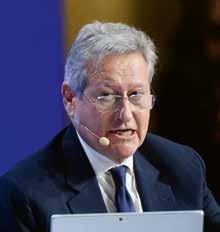

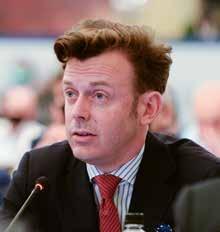
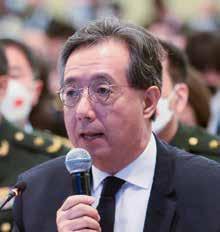
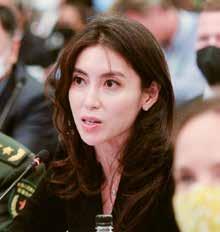

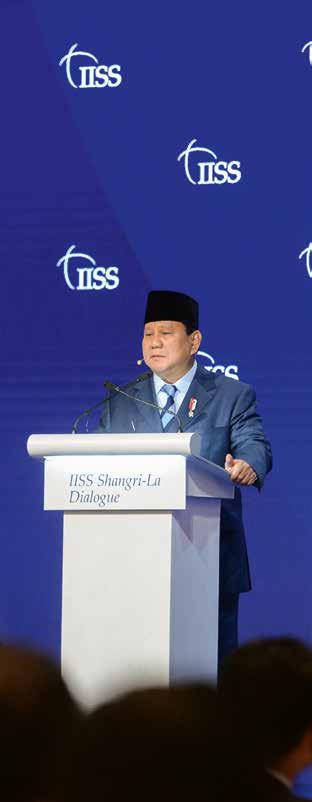

19TH ASIA SECURITY SUMMIT SINGAPORE, 10–12 JUNE 2022
Saturday 11 June 2022, 09:30
General (Retd) Prabowo Subianto
Minister of Defence, Indonesia Sébastien Lecornu
Minister of the Armed Forces, France Kishi Nobuo
Minister of Defense, Japan
General (Retd) Prabowo Subianto, Minister of Defence of Indonesia, began his remarks by stress ing that Southeast Asia is ‘the most affected by big-power competition’ and that the sub-region has developed over the last 40–50 years its own ‘Asian way of resolving these challenges’ despite differences and confrontations.
According to Prabowo, such a way ‘respect[s] all the big powers and all the powers that need to have their space, their rights respected’. This includes China, which he described as a great power that has existed for thousands of years in Asia and that has influenced the societies in the sub-region throughout history. Prabowo further stressed Indonesia’s his torical position to be non-aligned militarily. He also remained optimistic about the future that the Indo nesians are ‘convinced that the leaders of China will stand up to their responsibility with wisdom and benevolence because it is their philosophical teaching’.
Prabowo referenced the situation in Ukraine and stated that the Russian war on Ukraine shows that security and independence should not be taken for granted. Thus, he declared Indonesia’s determination to strengthen its defence. Prabowo ended his remarks with a forward-looking note that that the Indonesians are ‘convinced that wisdom, rationalist, common sense will prevail’.
In his de facto inaugural address to the IndoPacific, Sébastien Lecornu, Minster of the Armed Forces of France, began his speech by stressing that ‘France is a several-times resident nation in the Pacific’ and that the France’s interests are closely interlinked with that of the region. Before diving deeper into the details, he also referred to Russia’s aggression against Ukraine, and made clear his views that ‘threats against the security of Europe are threats for the rest of the world’. Consequently, ‘the security threat elsewhere in the world continues to be a priority for Europe’.
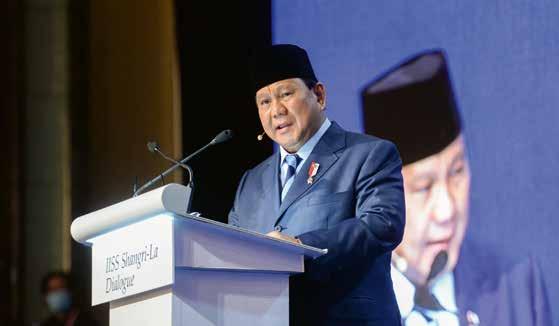
According to Lecornu, there are ‘three main stakes in the geopolitical rivalries in the Asia-Pacific area’. Firstly, the competition between powers is increas ingly becoming diverse and tough with various dimensions — economic, technological and military. He mentioned that a Taiwan Strait crisis could have ‘devastating consequences for all, even beyond the region’. Secondly, collective response mechanisms have become fragile and multilateral forums have been challenged. Thirdly, there are other security challenges that accompany great-power competition such as fishing, mining, climate change, natural dis asters and the fragility of supply chains.
As a response, Lecornu referred to France’s 2018 Indo-Pacific defence strategy and underscored its per manent and significant military assets in the region, including in Djibouti and the United Arab Emirates. The minister also pledged that France would continue to reinforce and modernise in the Indo-Pacific, including the Pacific Islands. In addition, Lecornu stressed that French commitment is cooperative and he reempha sised French interest to join the ADMM+. He concluded his speech by reaffirming French position that ‘the challenges induced by the geopolitical rivalries in a multipolar region require an inclusive and multilateral response based first of all on the respect of the law’.
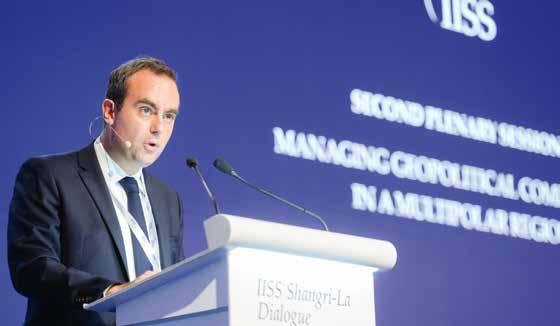
Kishi Nobuo, Minister of Defense of Japan, started his remarks by condemning Russia’s ‘outrageous
acts of aggression against Ukraine’ as ‘nothing but a unilateral change of status quo by force’, ‘a clear infringement of Ukraine’s sovereignty and territorial integrity’, ‘serious violation of international law and the United Nations Charter’ and a ‘grave breach of international humanitarian law’ for its mass killing of civilians. After that, he characterised the current geopolitical environment as a ‘competition between countries protecting the rules-based international order and those attempting to change it by force’.
Kishi listed three lessons to be learnt from the ongoing war. Firstly, he described as ‘real and present’ the security challenges posed by countries that disre gard the rules while possessing nuclear weapons or developing them. Secondly, he observed the ‘steadfast resistance’ from the invaded country and international community’s cooperation could curtail the momen tum of the aggressor. Thirdly, Kishi noted distance does not undermine collective international efforts. He thus called for the international community to main tain solidarity in their efforts to support Ukraine.
He further raised several points on the applica tions of these lessons for the Indo-Pacific region. One is the intensifying military activities in East Asia and the western Pacific driven by deepening Sino-Russian relations. Another is challenges in maritime domain through use of force, especially in the East and South China Seas. Kishi also underscored the importance of
peace and stability in the Taiwan Strait to the stabil ity of Japan and the international community. Finally, he stated that the North Korea’s missile launches are ‘totally unacceptable’.
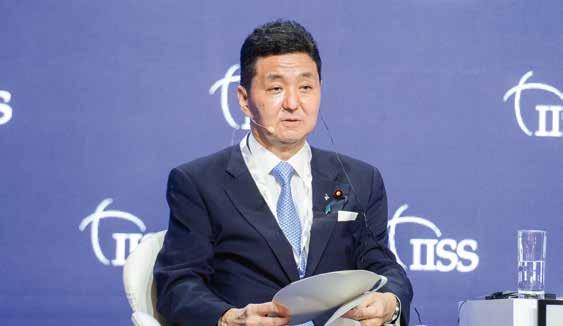
Kishi raised several ways on how Japan is trying to tackle these challenges as a ‘frontline’ country. One is to ‘accelerate the fundamental reinforcement of defence capabilities’. Another is to promote the free and open Indo-Pacific vision to protect the rules-based order. He also underscored the importance of cooperating with ASEAN and reminded these countries that ‘collaborat ing with countries that ignore the rules can never be mutually beneficial’. Kishi ended his remarks by call ing for countries to ‘strategically convey the message that they will be working together in solidarity’ and to strengthen their defence capabilities against any viola tors of the rules-based international order.
the Indo-Pacific and the world’. Aaron Connelly, IISS Senior Fellow for Southeast Asian Politics and Foreign Policy, asked what Indonesia’s ‘free and active foreign policy’ looks like at present. Sofie Syarief, a journalist and news producer from Kompas TV, asked how Indo nesia will navigate security issues concerning China in the South China Sea and in East Asia in light of Jakarta’s growing economic cooperation with Beijing.
Several delegates asked about Japan’s security per ceptions and plans to ‘drastically reinforce’ Japan’s defense capabilities. More specifically on nuclear chal lenges, Ankit Panda, Stanton Senior Fellow from the Carnegie Endowment for International Peace, asked Kishi why China would build up its nuclear capability and ‘what the implications are for peace and security in
There were also several questions on Europe’s rela tionship with the Indo-Pacific region. Cui Tiankai, former Chinese ambassador to the US, asked if the European countries will ‘respect and appreciate the Asian way of solving problems’ rather than imposing ‘the NATO way or the European way’. Mentioning the absence of the defence ministers from the UK and Ger many, Rym Momtaz, Senior Correspondent of Politico, questioned the credibility of Europe’s commitment in the region. Darshana Baruah, Fellow of the South Asia Program of the Carnegie Endowment for Inter national Peace, asked about the potential return of the trilateral partnership involving India, Australia and France. James Crabtree, IISS–Asia Executive Director, posed a query about the prospects of a rapproche ment between France and Australia. Finally, Natalie Sambhi, Executive Director of Verve Research, asked Prabowo whether he thinks AUKUS and the Quad are compatible with the ‘Asian way’.
Kishi made clear his views that countries with nuclear weapons, be it Russia or others, are now ‘using them as a form of threat’ and that solid coordination among each other to ‘deliver a uni fied message’ is critical. He further highlighted the ‘need to reaffirm the ability to deter the use of nuclear weapons’. By quoting Nelson Mandela’s words that ‘your enemy does not necessarily be my enemy’, Prabowo underscored the importance of maintaining good relations with neighbouring counties and ‘all the great powers of the world’ despite differences. He also emphasised the impor tance of respecting ‘national interests and the rightful interests’ of China’ as well as the value of




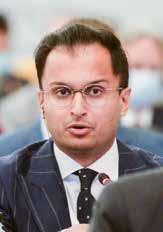

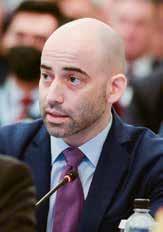
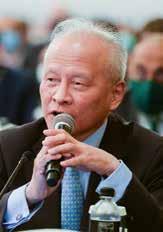
friendly cooperation to resolve differences with neighbouring countries.
Lecornu pushed back on Cui’s comment by empha sising that France’s regional approaches and interests are driven by its own populations in the South Pacific and it is interested to work with ASEAN’s multilateral forum. He stressed that challenges in Ukraine will not take Pairs away from important commitments in the region. Lecornu also asserted France and Australia are longtime partners and neighbours of the Indo-Pacific region. Meanwhile, Prabowo reiterated that countries should have their own right to decide their security priorities, but any alliances should respect the opinions and not threaten the interests of other countries, such as China.

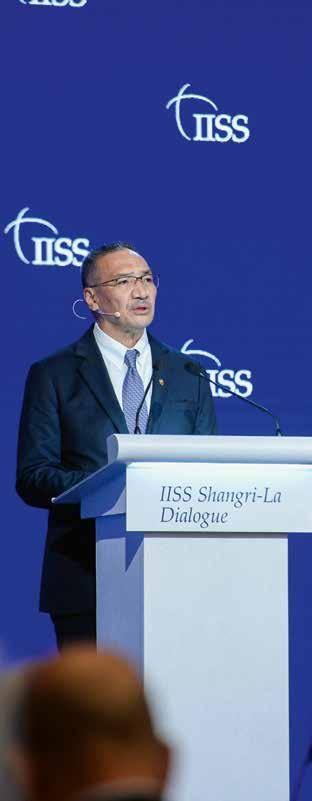

19TH ASIA SECURITY SUMMIT SINGAPORE, 10–12 JUNE 2022
Saturday 11 June 2022, 11:30
Dato’ Sri Hishammuddin Tun Hussein Senior Minister of Defence, Malaysia
Richard Marles
Deputy Prime Minister; Minister for Defence, Australia
Dr Khalid bin Mohammad Al Attiyah
Deputy Prime Minister; Minister of State for Defence Affairs, Qatar
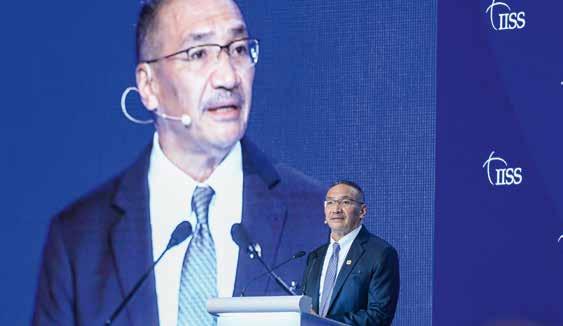
Dato´ Sri Hishammuddin Tun Hussein, Malaysia´s Senior Minister of Defence, opened the plenary ses sion by noting that the global COVID-19 pandemic and Russia´s invasion of Ukraine have pushed ´exist ing arrangements and partnerships to the limit’, ´revealing gaps and vulnerabilities´ that require a collective response.
In his view, the region faces four common secu rity challenges: ´an increase in transboundary crime from border re-openings; an upsurge in online disin formation arising from terror groups and extremists; the continued threat of biological warfare; and food security that is giving rise to instability worldwide’. In particular, food security is emerging as a major security challenge, and it is exacerbated by the Ukraine–Russia war. The minister warned that a ´combination of unhappiness from two years of the pandemic and rising food prices´ may generate a ´wave of political instability´ in Southeast Asian countries.
For Hishammuddin, new collective solutions are required to strengthen the regional architec ture in the face of these challenges. He highlighted two main instruments: ´strengthening sub-regional approaches´ and ´enhancing confidence and trustbuilding measures’. In this context, the minister observed that ´as groupings get too large, consensus making to solve real-time issues has been impeded’. There is thus value in ´engaging smaller, more tar geted groups that share a common threat as well as a common understanding of the ways and means to mitigate those challenges’. In his view, these subregional cooperation initiatives laid the foundations of wider security cooperation.
The minister referred to the Trilateral Cooperation Arrangement Malaysia, Indonesia and the Philip pines forged in 2016, and noted that these nations have agreed to incorporate Brunei into this group, forming a ´sub-regional quad´. Hishammuddin also
mentioned that the Malacca Strait Patrols (MSP) between Malaysia, Indonesia, Singapore and Thai land to secure the strategic and economically crucial waterway is a good example for such arrangements. He announced that these four nations have agreed to elevate the MSP to a ministerial dialogue to further strengthen cooperation.
Richard Marles, Australia´s Deputy Prime Min ister and Minister for Defence, opened his remarks by outlining the contours of his new government´s regional security and defence policy. Stressing that Australia would take its place in the world ´with con fidence’, he announced that under the leadership of Prime Minister Anthony Albanese, Australia would become a ´more engaged and responsive partner´ to its Pacific neighbours. A ´new era of engagement with the Pacific´ would be based on the notion that ´Pacific security challenges need Pacific security solutions´. In this context, Marles announced the establishment of an ‘Australian Pacific Defence School´ to train the Pacific Island defence and security forces, fulfilling a pledge made during the election campaign. In his speech, he also promised increased support for Canberra´s Pacific Maritime Security Programme.
In addition, Marles pledged to ´revitalise´ Australia´s engagement with Southeast Asia. This would include even closer military ties with countries in the region, the appointment of an ASEAN special envoy and support
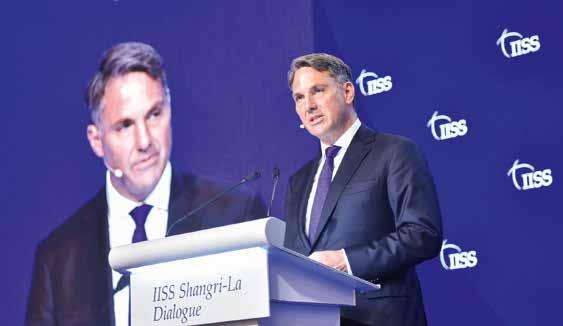
for ASEAN´s outlook on the Indo-Pacific. Marles prom ised a ´renewed focus on climate change’, pointing out that the ocean is being transformed into ´a source of anxiety and threat’.
Turning to Australia´s complex relations with China, Marles stated that Canberra values a ´produc tive relationship´ with Beijing. But he also noted that Australia wants to see a region ´where the sover eignty of all nations, large and small, is preserved, and where the rule of law, not the rule of power, governs conduct between states’. He further emphasised the responsibility for China to manage its rise, includ ing alleviating regional concerns regarding Beijing’s military build-up which could trigger neighbouring countries to seek to upgrade their defence capabili ties. Moreover, the minister pointed out that the fact that China has not made clear that it does not support Russia´s invasion of Ukraine should ´give us cause for concern, especially given the investments it is making now in its military power’.
Marles called for ´reassuring statecraft´ as an essential ingredient to instil confidence that global rules apply everywhere, including in the South China Sea. Reassuring statecraft is also needed to ensure peace and stability in the Taiwan Strait, as well as bringing about better relations between Australia and China. Marles pointed out that Australia´s military alliance with the US has ´never been more important´
for his country and that US engagement has ´never been more important to the stability and prosperity of the Indo-Pacific’.
Finally, the minister used his remarks to confirm that there would be no cuts to Australia’s defence spending, but that the Albanese government would continue the course to enhancing the Australian Defence Force with capabilities such as long-range and precision-strike weapons, offensive and defen sive cyber as well as area-denial systems. Marles also stressed that the AUKUS agreement would be ´central´ to deliver Australia´s nuclear-powered submarines and other advanced capabilities. Moreover, Australia would further seek to strengthen defence cooperation with Japan and India.
Dr Khalid Bin Mohammad Al Attiyah, Qatar’s Deputy Prime Minister and Minister of State for Defence Affairs, welcomed this year´s Shangri-La Dialogue as a significant opportunity to promote face-to-face diplomacy as a means to resolve pressing security challenges. In his view, the search for new forms of security cooperation has to be driven by the objective ´to unite and a protective approach to secu rity through collective strength building, aimed at bettering and advancing security rather than limiting and deterring others’ security’.
Qatar´s approach to security focuses on building well-trained and equipped forces ready to protect its
border with a ´360-degree´ focus on security, coupled with advancing traditional forms of security coop eration with allies and partners. The minister cited intelligence sharing, interoperability, peacekeeping initiatives, on top of training and education as areas for such cooperation. Internationally, Dr Attiyah stressed the need to expand and fortify global platforms that are designed to lead to global economic, political and social reform and advancement. He ended his remarks by pointing out that for ´security to be sustainable and resilient, it must be inclusive’.
Delegates asked a variety of questions ranging from the potential for security minilateralism, the role of AUKUS in regional security, to greater security inte gration between the Middle East and Asia. Anton La Guardia, Diplomatic Editor at The Economist, asked Hishammuddin whether his promotion of minilateralism is compatible with other minilateral arrangements in Asia. Major-General (Retd) Zhao Wenhua, Dean of China’s National Defense Univer sity, asked Marles if AUKUS is a ´mini-NATO or an Asia-Pacific version of NATO’. Sebastien Falletti, China Correspondent at Le Figaro asked about the potential for resuming Australia´s cooperation with France in the Pacific and in the security field. Camille
The IISS Shangri-La Dialogue
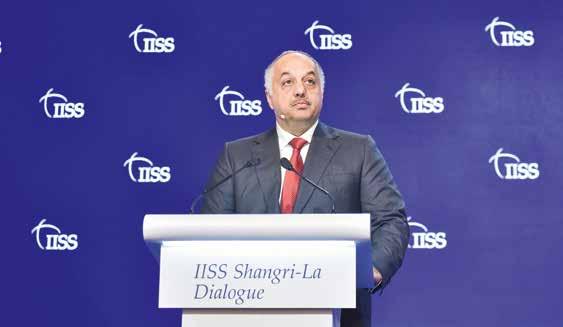
Lons, Research Associate at IISS–Middle East, asked Dr Attiyah whether energy interdependence would lead to greater political and security integration between the Middle East and Asia.

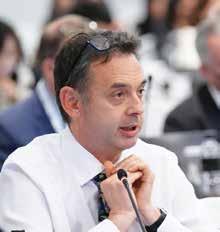
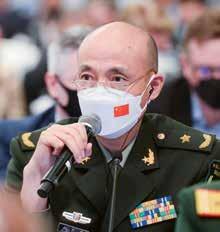
In his response, Marles stated that AUKUS is not a mini-NATO nor an alliance, but it is principally about developing joint capability between Australia, the UK and the US. He also confirmed that Austra lia is seeking to ´revitalise, reset, reinvigorate´ its relationship with France to meet common security challenges. Hishammuddin argued that multilater
alism and minilateralism are not exclusive and that one could have both. He also urged countries to be ´creative enough to be able to look at a situation where there’s a common threat, of sharing of a common sea, with a common aim to establish something more constructive without disturbing what we have inherited’. On the issue of greater security coopera tion between Asia and the Middle East, Dr Attiyah stated that Qatar is open to being used as a ´bridge´ to close the gap in perceptions between countries of these two regions.

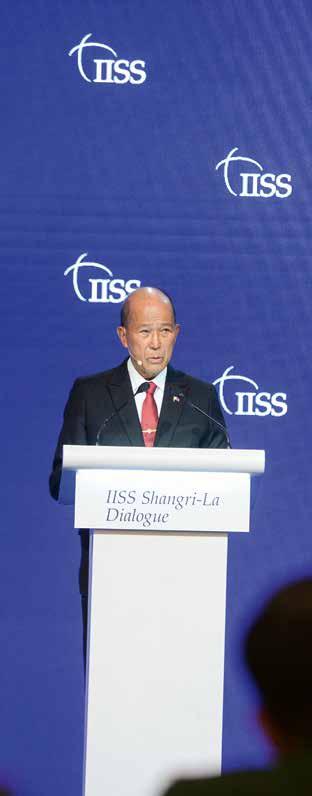

19TH ASIA SECURITY SUMMIT SINGAPORE, 10–12 JUNE 2022
Saturday 11 June 2022, 14:45
Delfin Lorenzana
Secretary of National Defense, Philippines General Tea Banh
Deputy Prime Minister; Minister of National Defence, Cambodia General Phan Văn Giang
Minister of National Defence, Vietnam
Delfin Lorenzana, then-secretary of national defense of the Philippines, opened the session by arguing that Asia-Pacific countries are operating in the context of major-power geopolitical competition. He suggested defence modernisation is a response to changes in the international security environment. While sin gling out deterrence as the primary goal for defence modernisation, Lorenzana stressed that for the Phil ippines, improved military capabilities could also contribute to humanitarian-assistance and disasterresponse tasks.
He pointed to technologies like artificial intelligence, fifth-generation telecommunication technologies and quantum computing as changing the character of warfare, for example by enabling grey-zone strate gies. Given the potential impact of some of these technologies on armed conflict, Lorenzana underlined the importance of international efforts to regulate their application.
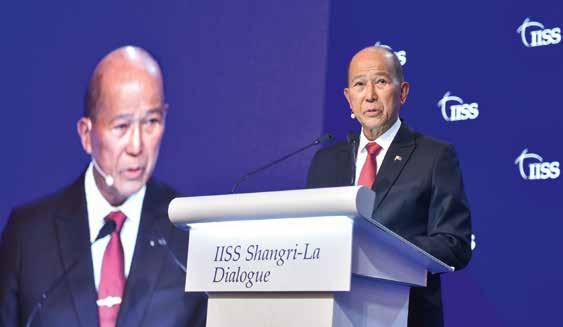
He reminded the audience that defence mod ernisation will likely divert resources from other government priorities such as social welfare or economic development, but also pointed out that technological advancement could reduce the cost of defence modernisation. As such, the Philippines is seeking to encourage technology transfer through coproduction or counter-trade. Lorenzana encouraged delegates to consider defence modernisation not just in terms of equipment and acquisitions, but to also to focus on personnel and leadership, as well as on doc trine and organisational reform.
General Tea Banh, Deputy Prime Minister and Minister of National Defence of Cambodia, began his remarks by cautioning that in the context of majorpower rivalries and changes in global and regional order, the formation of new regional alliances should not be directed at undermining the interests of others. He nevertheless stressed that defence modernisation
and defence capacity building are requirements for every nation seeking to adapt and prepare for a chang ing international security environment.
Tea Banh argued that while the ability to defend sov ereignty and territorial integrity is most important, the capability to support counter-terrorism, maritime secu rity, disaster relief and UN peacekeeping operations matters too. Clarifying that Cambodia does not support the application of sanctions as ‘it is not the right option to solve the problem’, the minister suggested Cambodia would use its 2022 chairmanship of the ASEAN Defence Ministers’ Meeting to focus on dialogue and practical cooperation on regional security challenges.
Referencing Cambodia’s Defence White Paper released in May 2022, Tea Banh stressed the expansion of peacekeeping capability and defence modernisation as military-reform priorities. In this context, the minis ter spoke about the modernisation of Ream Naval Base, arguing that it does not pose a threat to the security of any nation. Tea Banh also stressed that the constitution of the Kingdom of Cambodia does not allow for foreign bases on its territory. However, he noted that Cambodia ‘reserves the right to receive foreign assistance in vari ous forms’ to ‘self-defend and ensure public order and security within its territories’.
General Phan Văn Giang, Minister of National Defence of Vietnam, began by pointing out that while numerous non-traditional security challenges have
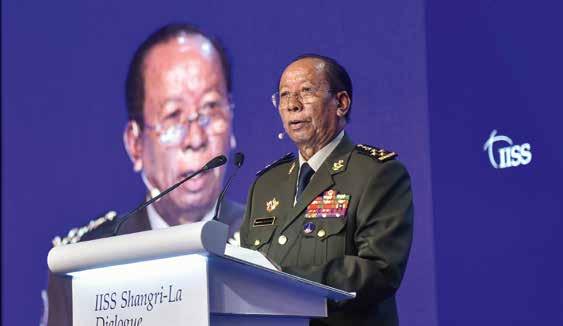
been emerging, traditional issues are still present and have become ‘more complicated’. He thus deemed that bolstering national defence capabilities is ‘truly an indispensable, objective demand’ for all countries. The minister encouraged delegates to look beyond the purchase and production of platforms when debating defence modernisation and pointed out five themes which are guiding Vietnam’s effort in this regard.
Firstly, General Phang emphasised the principle of ‘men before arms’ and suggested the need to build armed forces around loyal and capable personnel. Sec ondly, he noted the importance of organisational reform to create defence structures across permanent forces and reserve forces that are ‘lean, neat and strong’. The third element in Vietnam’s military modernisation is a focus on developing doctrine suitable for contemporary warfare accounting for technological developments.
The fourth factor, General Phang said, is the devel opment of a more self-reliant defence industry, and this is a goal dependent on international cooperation with partners. Defence industrial development would not only support defence modernisation but also socioeconomic development. Finally, the minister noted ‘modernising weapons and military equipment’ as the fifth element. He concluded by arguing that transpar ency surrounding defence modernisation plans in the region is important to avoid misunderstanding and the loss of trust among nations.
The session sparked wide-ranging questions from the delegates centred most around Vietnam and Cambo dia. Aaron Connelly, IISS Senior Fellow for Southeast Asian Politics and Foreign Policy, asked General Phang about the lessons he learnt from his service on Vietnam’s northern border with China. Bich Tran, Adjunct Fellow at the Centre for Strategic and Interna tional Studies (CSIS) and PhD scholar at the University of Antwerp, asked General Phang whether there is a more urgent need for Vietnam to diversify its armssupply relationships away from Russia given the
latter’s invasion of Ukraine. Greg Austin, IISS Senior Fellow for Cyber Power and Future Conflict, asked for Vietnam’s view of the global landscape in cyberspace and where Vietnam would be looking to build part nerships in cyberspace policy for the armed forces.

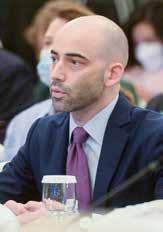

Sui-Lee Wee, Southeast Asia Bureau Chief for the New York Times, asked Tea Banh to elaborate on the arrangements Cambodia has with China for the development of Ream Naval Base. Blake Herzinger, Non-Resident Fellow of Pacific Forum CSIS, sought to clarify on the kinds of operations the People’s Liberation Army Navy would conduct from Ream

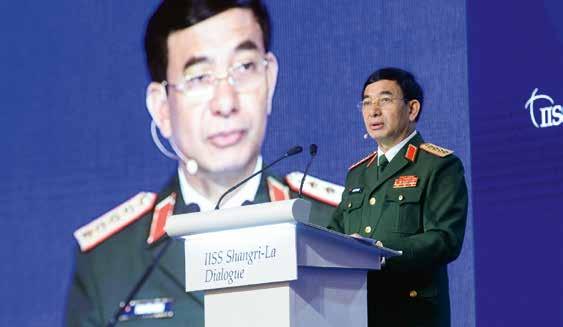
Naval Base. In the same vein, May-Britt Stumbaum, Team Leader of Asia-Pacific Security at Bundeswehr University Munich, wondered whether foreign investments in port facilities would create tensions or improve security, given the likely dual-use nature of the port.
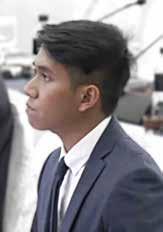
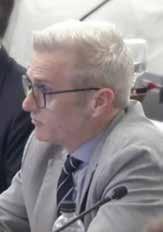

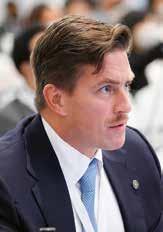
Continuing the focus on Cambodia, Chans ambath Bong , Deputy Director at the Centre for Inclusive Digital Economy of the Asian Vision Insti tute, asked General Tea Banh whether Cambodia’s recent efforts to recruit personnel to strengthen mis sile-defence capabilities were a response to regional developments or part of a long-term defence mod ernisation agenda. James Hackett , Editor of The Military Balance and IISS Senior Fellow for Defence and Military Analysis, asked General Tea Banh to outline other measures for defence transparency and confidence building, beyond the release of defence white papers.
General Phang responded by arguing that Viet nam’s efforts to strengthen its own defence industrial capacities would reduce the country’s dependency on international suppliers in the long run. He also under lined the need for dialogue to resolve disputes with near neighbours and suggested that Vietnam is look ing at cyberspace as both a defence issue and one of economic development.
General Tea Banh addressed questions by stress ing that Cambodia needs the capability to protect its maritime sovereignty and that the modernisation of Ream Naval Base seeks to support this goal. Spe cifically, the pier, dry dock and repair facilities will be upgraded and there will be work undertaken to enable the base to receive larger vessels. For these purposes, the minister said, Cambodia has received grant aid from China. Tea Banh also suggested that ships from any country would be able to access Cam bodian facilities for emergency repairs. The minister denied that China would have exclusive access to the base. As for recruitment activities, Tea Banh suggested they are driven by the requirements of Cambodia’s defence ministry.
Lorenzana, in his response, said that for regional countries, dealing with the increasing competi tion between major powers is like ‘walking on a tightrope’, and dialogue is a key ingredient to find ing a modus vivendi. On the issue of diversifying arms-supply relationships, Lorenzana pointed out that there is now a greater number of poten tial suppliers to choose from, which could lead to better value for money for importers. He consid ered the interoperability challenges that might arise from buying equipment from a variety of sources as manageable.

19TH ASIA SECURITY SUMMIT SINGAPORE, 10–12 JUNE 2022

SPECIAL
Saturday 11 June 2022, 16:00

The IISS broke from its longstanding rule of no virtual presentations at its in-person dialogues for a special address by Ukraine’s President, Volodymyr Zelen skyy . Introducing the speaker, IISS Director-General and Chief Executive Dr John Chipman noted that ‘a hot head and cold heart lead to bad strategy’, and in turn described Zelenskyy’s brand of stra tegic leadership as a combination of a ‘cool head and warm heart’. Though the war in Ukraine might appear distant from the Indo-Pacific region, ‘its effects are now global’.
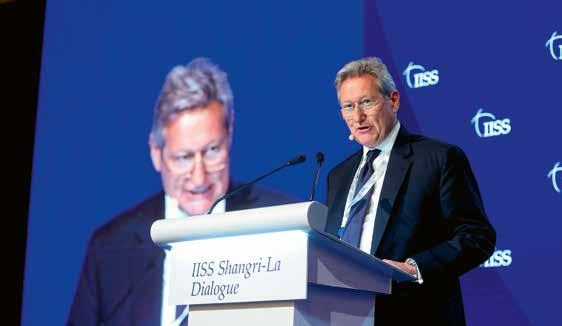
Zelenskyy opened his address by highlighting the story of a young Singaporean designer who sent him a t-shirt as part of her initiative to support Ukraine. Zelenskyy used the shirt to demonstrate both the support Ukraine has received globally and Ukraine’s positive response to this support. He described the present conflict as ‘the confrontation between the possible, which we and many people in
the world need, and the impossible for which Russia is so desperately fighting’.
Zelenskyy said that Russia’s invasion of Ukraine’s territory has undermined confidence in ‘basic free dom for peace and prosperity in every corner of our planet’. He also noted that Russia’s blockade has transformed the Black Sea into ‘the most perilous sea in the world’, making freedom of navigation impossi ble. He expressed confidence that the global audience has the same interests in preserving freedom and inde pendence in their respective countries as Ukrainians are currently defending theirs.
Zelenskyy dismissed Russia’s framing of the war with regard to NATO and the United States as ‘assiduous’ propaganda. He said that ‘Russian lead ership strives to discard all the achievements of the historical development of humankind’. He warned of the erosion of international law, quoting Singa pore’s first prime minister Lee Kuan Yew, who once
said that ‘if big fish ate small fish and small fish ate shrimp, we would not exist’. Zelenskyy stressed that ‘we must value what has become possible, thanks to wise leadership in the past, thanks to the strug gle of many generations’. He characterised Russia as ‘trying to bring the world back to the old times’ before international law.
Zelenskyy called for further measures to ‘break the ability of Russia’ to carry out the maritime block ade so that Moscow will understand ‘its belligerent policies will have consequences’. He warned that without further action, the world would face food shortages and famine, which could lead to politi cal chaos in many countries. Zelenskyy also called for ‘concerted’ action to hold Russia accountable for its killings, torture, deportations, destruction of cities, use of prohibited weapons, as well as threats of using chemical and nuclear weapons. As the UN system in its current form ‘does not give equitable representation’, Zelenskyy urged reforms that would strengthen the international body’s ability to respond to violations of international law.
In closing, Zelenskyy expressed gratitude for sup port to Ukraine, but noted that ‘our and your future(s)’ are linked. Rejecting ‘right of might’, he concluded that ‘it is on the battlefield in Ukraine that the future rules of this world are being decided along with the boundaries of the possible’.
Dr Maria Shagina, IISS Diamond-Brown Research Fellow for Economic Sanctions, Standards and Strategy, opened by thanking the president in the Ukrainian lan guage. She then asked regarding the best strategy for an international response to the global food-security crisis, and the kind of security guarantees Ukraine would wel come. Zelenskyy replied that Russia’s blockade of the Black and Azov Seas violates international law as it is obstructing food exports to vital destinations. Ukraine is ‘ready to communicate with the civilised world’ and supports ‘a safe transport corridor’ to export grain, comprising ships from Ukraine’s partners.
In relation to a Russian sea corridor, he said that ‘we do not believe Russia’, and noted options for rail transportation through the Baltic states and Poland. Zelenskyy said that Russia is repeating its playbook of blocking a key resource to cause prices to skyrocket, and then positioning itself as ‘a saviour’.
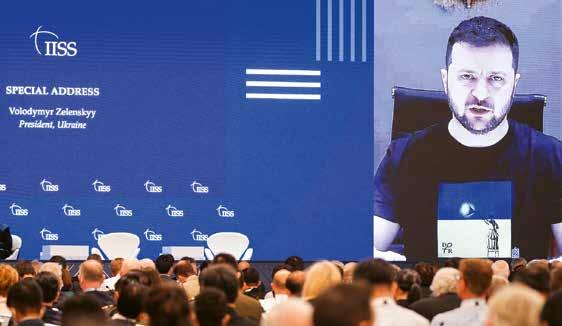
Regarding security guarantees, Zelenskyy said that Ukraine is in negotiations with partner countries and the G7. He said that the agreement under discussion ‘will set out the details to make sure that our people are not afraid of living in Ukraine, and to ensure that we are able to build a progressive system of security’. He added that this system could be a model for other countries.
Josh Rogin, a Washington Post columnist, referred to Japanese Prime Minister Fumio Kishida’s statement
in the keynote address that ‘Ukraine today could be East Asia tomorrow’. He asked how Taiwan might stand up to China as it pursues control ‘in the Rus sian mould’. Zelenskyy replied that ‘today’s example of Ukraine is the example for the whole world’. He said he supports ‘any action’ that forestalls war, stat ing that war does not benefit anyone, except for certain political leaders who ‘keep growing their appetites and their ambitions’. According to him, the world cur rently ‘enables’ such leaders.
Zelenskyy also called for a diplomatic resolution so that countries in need of help would not be left ‘at the mercy’ of another, more powerful country. He encouraged diplomatic measures to come pre-emp tively, before hostilities break out and lives are lost, and reminded the audience of the broad impacts of a refugee crisis.
Matthias Gebauer, Chief Reporter at Der Spiegel, asked about the risks of overly provoking Russia, as raised by French President Emmanuel Macron, and whether this has affected the resolve of Zelenskyy and Ukraine’s fighting forces. Zelenskyy responded that going too far would mean an incursion into Russian territory, which Ukraine has no intentions to do, since it respects sovereignty and territorial integrity.
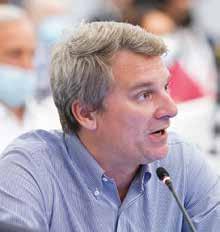

He also urged the audience to remember that Ukraine is pressuring Russia because ‘this is the war on our soil’. Sanctions and deliberations had been needed ‘before the full-blown war started’ and ‘now, there is no grey zone’. He said that ‘Russian leadership cannot be comforted any longer. It is too late.’ Con cluding his speech, Zelenskyy argued that ‘the whole world must put the Russian leadership in place, and their place is on their territory’.
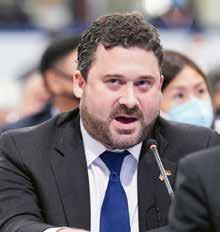

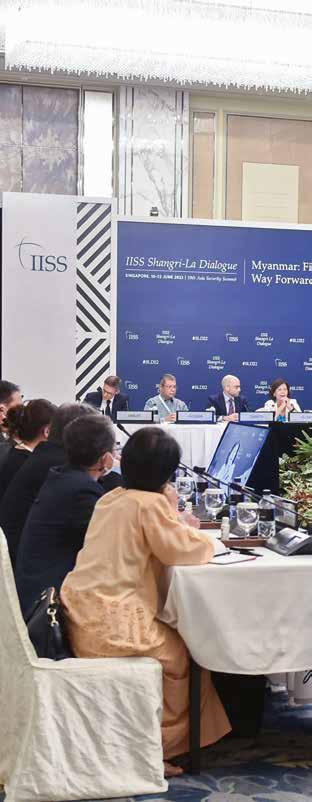
IISS Shangri-La Dialogue Senior Fellow for AsiaPacific Security and Co-Editor of the Asia-Pacific Regional Security Assessment
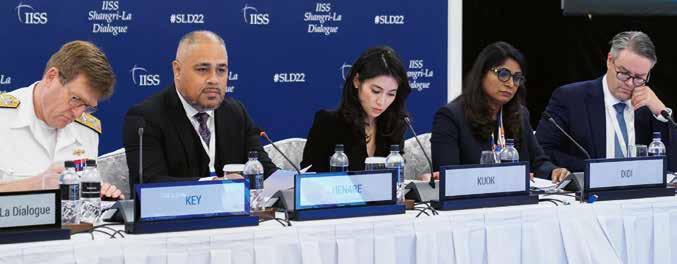
Mariya Ahmed Didi
Minister of Defence, Republic of the Maldives
Peeni Henare
Minister of Defence, New Zealand
Dr Tobias Lindner
Minister of State, Federal Foreign Office, Germany, Admiral Sir Ben Kay
First Sea Lord and Chief of Naval Staff, Royal Navy, UK
Opening the special session, Mariya Ahmed Didi explained that there is undeniable evidence from global conflict zones indicating that climate change is a major driver of violence and conflict. Climate security is an area where the stakes for Maldives are high: 99.7% of the country is the sea and most of its islands rise barely three feet above the sea level. Didi added that a closer alignment of climate advocacy and defence diplomacy is needed. She recommended nations that are increasing defence expenditure to ensure their new investments reduce carbon emissions.
Peeni Henare noted that the effects of climate change are being felt both in New Zealand and its southwest Pacific neighbours. He referenced the New Zealand Defence Force’s (NZDF) valuable role in disaster response and recovery, including in aerial-surveillance and engineering capabilities. The NZDF’s four-pillar approach to climate security involves: respond, adapt, mitigate and engage. Carbon neutrality, Henare stated, is a goal the NZDF is working towards. This will involve reducing emissions of military vehicles, ships
and aircraft. The minister also stressed the importance of partnerships with other militaries and countries.
Dr Tobias Lindner shared that Germany and the EU have been intensifying political cooperation with IndoPacific countries to help mitigate the effects of climate change and increase regional resilience. He also under scored that support and cooperation must not create political or economic dependencies. Referencing ‘hard lessons’ learnt from the Ukraine war due to dependency on Russian oil and gas, Lindner stated that energy transi tion to fossil-free energy has become a ‘cornerstone’ of Germany’s security policy.
Admiral Sir Ben Kay saw climate change as an ’existential threat to all of mankind’ that exceeds the gravity of any conflicts or crises we are facing. He deemed the legally binding goal set by the UK military to achieve net zero by 2050 not only a moral requirement, but also a reputational one. There is also
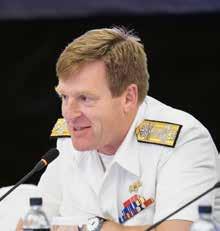
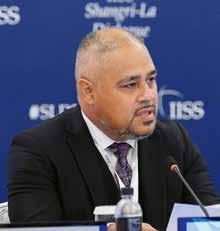
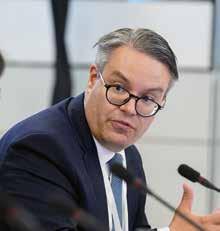
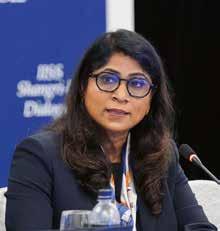
a business case for armed forces to move towards lowcarbon technologies in line with commercial trends. Finally, Admiral Kay argued for an operational case for green technology that reduces logistic require ments and dependencies, thus increasing operational range and security.
There was a wide-ranging discussion between panellists and audience. Topics raised included the potential role of the UN Security Council and EU, incor porating climate security in national security policies, the need for more transparency of carbon emissions and for better articulation of the business case for green transition by the military. Some panellists felt that the requirement to incorporate new technologies should see equipment having shorter life cycles, but the major ity opinion was that major platforms should have longer length of service, providing opportunities to apply new technology during major updates.
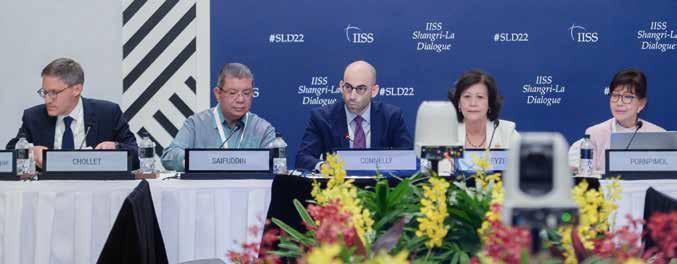
IISS
Dr Noeleen Heyzer
Special Envoy of the Secretary General on Myanmar, United Nations Dato’ Sri Saifuddin Abdullah
Minister of Foreign Affairs, Malaysia Pornpimol Kanchanalak
Adviser to the Minister of Foreign Affairs and Special Representative of the Minister of Foreign Affairs on Myanmar, Thailand
Derek Chollet
Counselor, US Department of State
Dr Noeleen Heyzer described the worsening situation in Myanmar as a combination of political crisis with a ‘multidimensional crisis of collapsing state institutions’ and highlighted the dire need for humanitarian aid. She observed that the positions of conflicting parties have ‘hardened’ and highlighted the lack of a ‘miss ing middle’ to resolve the crisis. Besides calling for a regional solution including and beyond ASEAN mem bers and more strategic support from the international community, she emphasised the need for a Myanmarled process reflecting the will of its people and for building resilience at the local level.
Dato’ Sri Saifuddin Abdullah echoed Dr Heyzer’s observation of the worsening crisis in Myanmar. He stressed that Malaysia does not recognise the junta government, but would engage them as needed. He also noted the National Unity Government (NUG) and other resistance groups are important stakeholders to be engaged with informally. Acknowledging that the Five-Point Consensus have not achieved much prog ress, Saifuddin called for a more detailed roadmap of
the consensus that includes listing the timeframe and specific stakeholders.
Pornpimol Kanchanalak noted that ‘condem nations, sanction, ostracisation as well as punitive measures have reached diminishing return’ and emphasised that roadmap and modus operandi must be set out for Myanmar to return to normalcy. Hence, she opined that the new election slated by the FivePoint Road Map to be held in August 2023 should be taken at ‘face value’ to move the peace process forward, despite concerns about its validity and prac ticality. Pornpimol also stressed the importance of the international community to bring all stakeholders to the dialogue table.
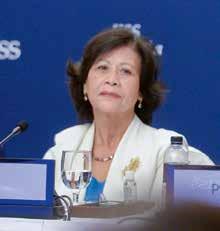
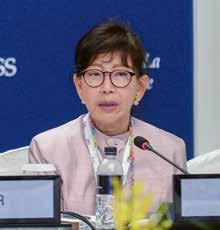
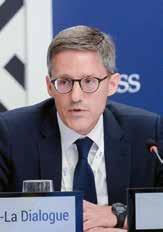
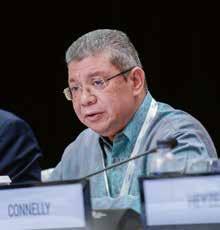
Derek Chollet stated that the US’ overall goal is to foster the conditions that would end the crisis and help Myanmar move towards an inclusive, multiparty democracy. He noted that US efforts include intensify ing economic and political pressure on the junta regime through sanctions, supporting the pro-democracy
movement and delivering humanitarian assistance directly to the local civilians in coordination with allies and partners. Unlike Pornpimol, Chollet opined that the 2023 elections should be not endorsed given the unlikelihood of the election being free and fair.
In response to the question posed regarding pos sible ways to increase pressure on the junta regime, Chollet responded that the US has called for an arms embargo but is not considering supplying weapons to the NUG. Saifuddin proposed that another way is to talk to parties that the junta would want to listen, including dialogue partners of ASEAN. The panellists also discussed the future role of the military, given that it has lost most of the popular support in the country. While both Heyzer and Pornpimol acknowledged the need to engage the military, Heyzer noted signs of local democracies forming on the ground. Moe Thuzar from the ISEAS – Yusof Ishak Institute also provided a Myanmar perspective of crisis, including the role and reach of the military.
IISS Shangri-La Dialogue Senior Fellow for AsiaPacific Security
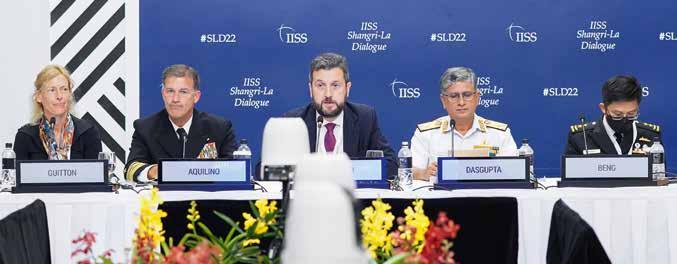
Vice Admiral Biswajit Dasgupta Flag Officer Commanding-in-Chief, Eastern Naval Command, India
Alice Guitton
Director General, International Relations and Strategy, Ministry of the Armed Forces, France
Rear Admiral Aaron Beng, Chief of Navy, Singapore
Admiral John Aquilino Commander, Indo-Pacific Command, US
Vice Admiral Biswajit Dasgupta kicked off the discus sion by observing that the UN Convention on the Law of the Sea is the foundation of the rules-based international order at sea. However, he said disputes, differences of interpretation and miscalculation can lead to crisis. While multiple channels of communication exist, the onus is on the parties to disputes themselves to identify the best and quickest means to reduce risk. Governments also need to work out crisis-communications strategies.
Alice Guitton underscored the fact that the issues at sea are global because the maritime domain is intercon nected but also fragile, in part due to climate change. Hybrid and proxy threats are on the rise, she said, and these challenges affect the entire water column includ ing the seabed. National, bilateral and multilateral approaches to protecting the maritime domain are all applicable, she argued. In particular, codes of conduct in waters like the South China Sea need to accord with international law to reduce tensions.
Rear Admiral Aaron Beng pointed to some of the regional successes in promoting good order at
sea, including joint patrols, information sharing and crisis response such as in the search for Flight MH370. Underlying relationships and interoper ability are key, he argued. Admiral John Aquilino highlighted the high-level relationships between likeminded nations, but pointed to the aggressive actions of China, Russia and North Korea creating, he said, potentially the most dangerous security situation since the Second World War. However, he said the US continues to reach out to encourage communication.
In response to questions, Admiral Aquilino pointed to the mechanisms that exist for communicating with the Chinese military leadership. Other panellists
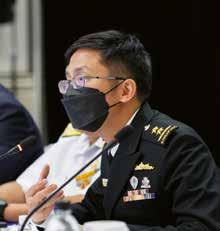
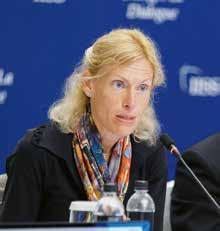
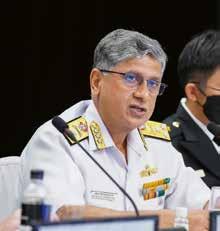
noted challenges that navies face in engaging with paramilitary organisations. Guitton viewed presence, information sharing and attribution as keys to coun tering illegal activities by paramilitary groups and non-state actors. There was also discussion of ways to improve submarine operational safety in the region. Among the major trends, there was acknowledgement of the increased number of minilateral and multilat eral exercises and activities as well as initiatives to improve maritime situational awareness. The prolif eration of maritime information fusion centres was noted, and Rear Admiral Beng said there is room for further development in this area.
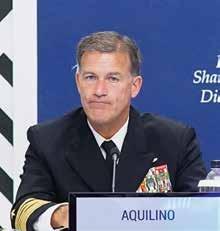


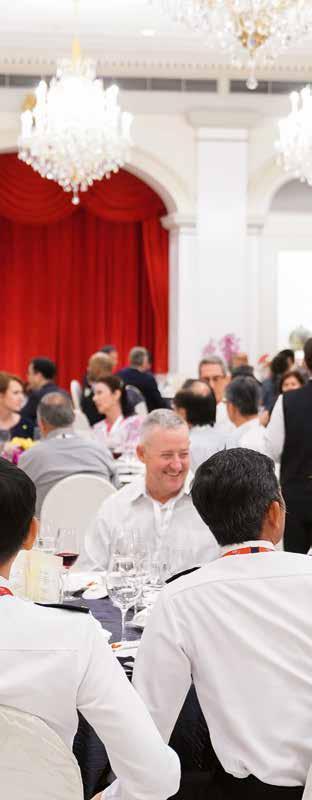

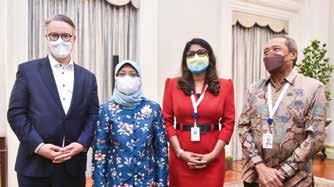
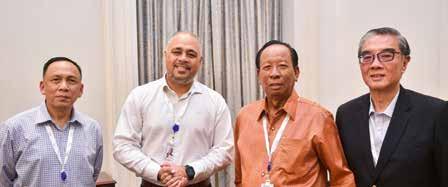

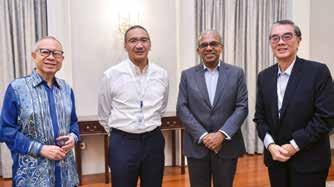
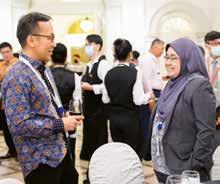
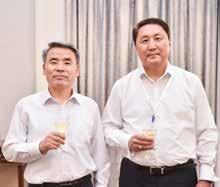
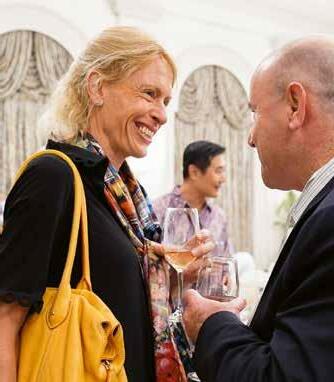
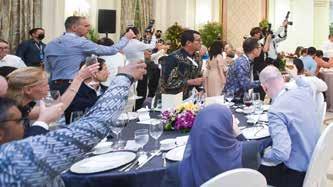
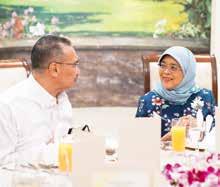
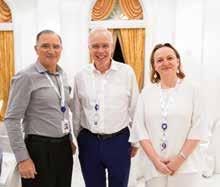

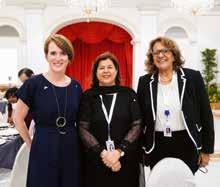
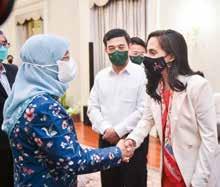
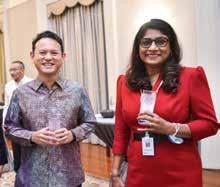

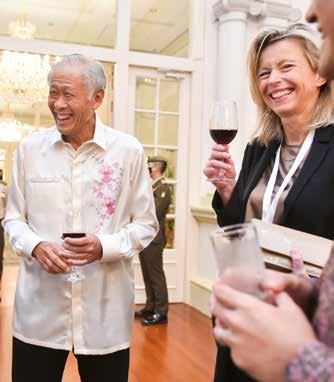

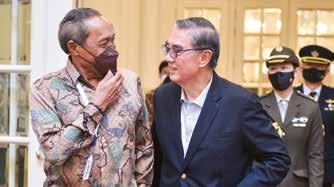
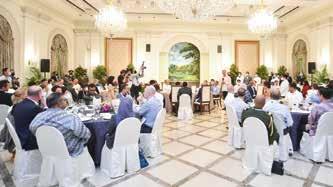
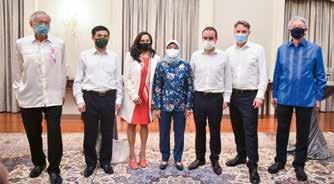
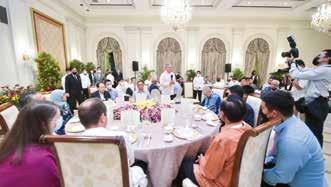
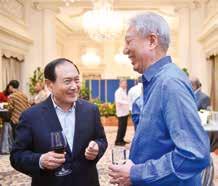

19TH ASIA SECURITY SUMMIT SINGAPORE, 10–12 JUNE 2022

Sunday 12 June 2022, 08:35
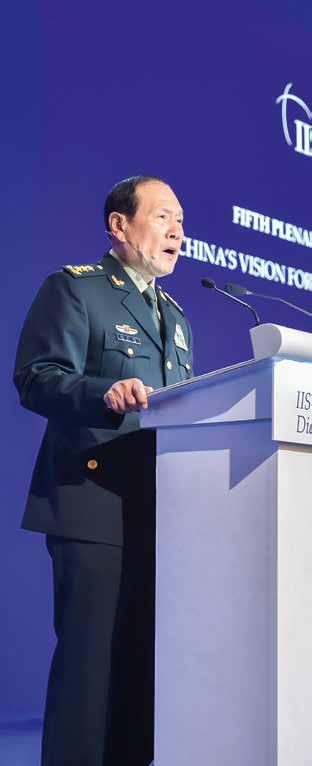
China’s Minister of National Defense and State Coun cilor General Wei Fenghe opened his speech with a stated purpose of fostering peace and stability in the Asia-Pacific region and building friendship and coop eration. The world, he said, is currently facing multiple crises rarely seen in history: from the COVID-19 pan demic to economic challenges and the Ukraine ‘crisis’.
To tackle these challenges, China believes that coun tries should: 1) strengthen solidarity and coordination while opposing ‘exclusive blocs’; 2) uphold fairness and justice and ‘oppose hegemony under the guise of mul tilateralism’; and 3) uphold the rule of law and ‘oppose acting on one’s own’. These three points were directed at the United States, whose Indo-Pacific strategy was called ‘an attempt to build an exclusive small group in the name of a free and open Indo-Pacific, to hijack coun tries in our region and target one specific country’.
Next, General Wei proposed that all countries should promote mutual learning and exchange. He
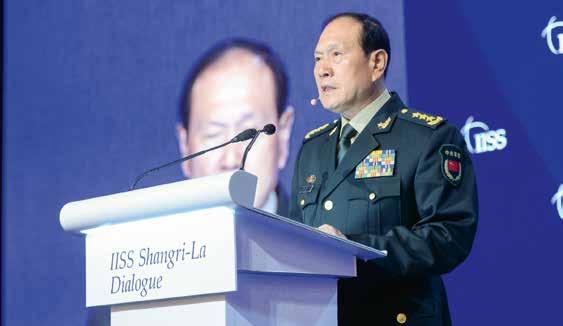
emphasised that ‘the right path for a country must fit its realities’ of culture, history, ethnicity, religion and development models and none should be char acterised as superior or inferior. General Wei also emphasised that not allowing countries to choose their own paths equates to ‘turn[ing] away from common values of democracy and freedom’.
General Wei then proposed how China would play a positive role within the region and wider global system. In particular, the Chinese government and military would contribute to world peace and safeguarding the international order. General Wei raised examples of such contributions by referencing China’s ‘strategic outcome’ in its COVID-19 response at home and across 170 countries, including through defence diplomacy.
Secondly, General Wei highlighted that China’s economic growth has benefited Chinese citizens by lifting them out of poverty, while also contributing
roughly 30% of global economic growth. Lastly, Gen eral Wei described the military as a ‘force for peace’ and one that is defensive in nature. China, he stated, will ‘never seek hegemony or engage in military expansion’. General Wei pointed to the PLA’s positive contribution to world peace through its participation in UN peacekeeping efforts and anti-piracy missions. As the PLA grows, so too does its ability to add to the ‘growth of the global force for peace’.
Within the context of Chinese President Xi Jin ping’s Global Security Initiative, where each country should accommodate the core interests and major concerns of each other, General Wei outlined China’s non-negotiable position on reunification with Taiwan. He emphasised that ‘Taiwan is first and foremost China’s Taiwan’ and Taiwan is ‘an internal affair of China’s’. He also asserted that ‘China will definitely realise its reunification’ which is ‘a historical trend that no one and no force can stop’. While China prefers to achieve reunification through peaceful means, it will also resort to force if necessary.
In connection, General Wei warned against sup port for Taiwan independence, predominantly by the Democratic Progressive Party (DPP) that is ‘attempt ing to change the status quo that both the mainland and Taiwan belong to one China’. He also referred to the DPP authorities as a ‘prong of anti-China foreign groups that would be used and ultimately abandoned by their masters’. If there is any attempt to secede Taiwan from China, General Wei avowed that China will ‘fight at all costs’ and ‘fight to the very end’. In an attempt to draw parallels, General Wei also referred to the US’ own civil war for its unity. He then referred to the broader ‘foreign interference’, which he deemed is ‘doomed to failure’.
On the South China Sea, General Wei remarked that China calls for turning it into a ‘sea of peace, friendship and cooperation’. He claimed China and ASEAN’s cooperation has ensured stability in the area, and freedom of navigation is not under threat, apart from ‘some’ foreign countries meddling. On China–US relations, General Wei acknowledged that bilateral relationships are at a ‘critical and crucial juncture’. He called on the US to stop smearing and containing China, and to stop interfering in China’s
internal affairs. He noted that both militaries should endeavour to achieve a ‘stable bilateral relationship’ through ‘enhanc[ing] strategic trust, avoid[ing] misun derstanding and miscalculation, manag[ing] risks and crisis and prevent[ing] frictions and conflicts’.
Referring to the Ukraine war as a ‘crisis’, Gen eral Wei questioned the real root of the crisis and its ‘mastermind’. He affirmed that China supports the UN Charter and while respecting sovereignty and territorial integrity of all countries, the general also stressed the legitimate security concerns of all parties. He stated that China does not support maximum pres sure or sanctions, which it thinks will exacerbate the situation. General Wei also conveyed that China is committed to supporting talks between Russia and Ukraine and expressed hope that the US and NATO will have talks with Russia to create conditions neces sary for an early ceasefire.
General Wei’s speech prompted 11 questions from the delegates, ranging from China’s military-modernisa tion goals and recent capability-related developments to its policy on Taiwan and its bilateral relationship with Russia. Meia Nouwens, IISS Senior Fellow for Chinese Defence Policy and Military Modernisation, asked whether General Wei could provide greater clarity on the PLA’s 2027 benchmark, which some analysts think is an indication of sped-up modernisa tion efforts. While General Wei did not clarify the 2027 goal, he did provide some new details in his answers to questions about China’s nuclear- and missile-devel opment programmes.
Alastair Gale, Asia Security Correspondent and Japan Editor of the Wall Street Journal, asked what the purpose of the roughly 300 alleged missile silos in Western China is, and whether these are intended to be used to deploy intercontinental ballistic missiles. General Wei responded that China’s nuclear capability is for self-defence and that Beijing’s no first-use policy remains in place. In addition, he noted that China has equipped the PLA with the nuclear arms displayed in the 2019 military parade. China will maintain a nuclear force size that ensures its ability to prevent nuclear war.
Fifth plenary session
Demetri Sevastopulo, US China Correspondent for the Financial Times, asked General Wei to clarify what the weapon China tested on 27 July was and its purpose. To this, General Wei confirmed that this was indeed one of China’s ‘new weapons’ and asserted that they are for ‘protecting peace and national inter ests of China’.

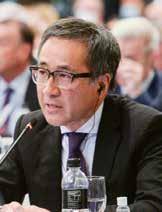
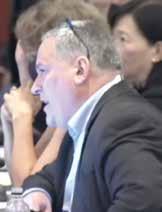
When asked about regional disputes involving Taiwan, the South China Sea, North Korea, Vietnam and India, General Wei again presented China as adhering consistently to its policies and promoting stability in the region. On Taiwan, he maintained that ‘Taiwan is China’s Taiwan’. On the South China Sea, he responded that a resolution should be found only between countries in the region. On the China–India border dispute, he noted that both countries have had 15 rounds of corps commanderlevel negotiations and would continue to work together for peace. Regarding North Korea, General Wei viewed that the security concerns of all parties should be accommodated and urged countries to
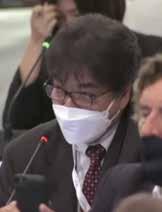
help Pyongyang solve its problems. On Sino-Viet nam ties, General Wei suggested that both countries enjoy a ‘very good’ relationship.
Lastly, on the Ukraine war, General Wei was asked various questions about China’s bilateral relationship with Russia. Taketsugu Sato, Senior National Secu rity Correspondent from Asahi Shimbun, asked about whether or not it would denounce Russia’s illegal inva sion of Ukraine. Hiroyuki Akita, Commentator for Nikkei Asian Review, asked whether China has provided support to Russia since the start of the conflict. On the first point, General Wei pointed out that China, too, has suffered food and energy crises because of the war. He affirmed that China has ‘never’ provided any material support to Russia since the start of the Ukraine ‘crisis’. The general characterised China–Russia relationship as one of partnership, not an alliance, and noted it will continue to grow. While General Wei referred to Rus sia’s invasion of Ukraine as a crisis in his speech and the first half of his question-and-answer question, he referred to it as a ‘war’ in the second half.
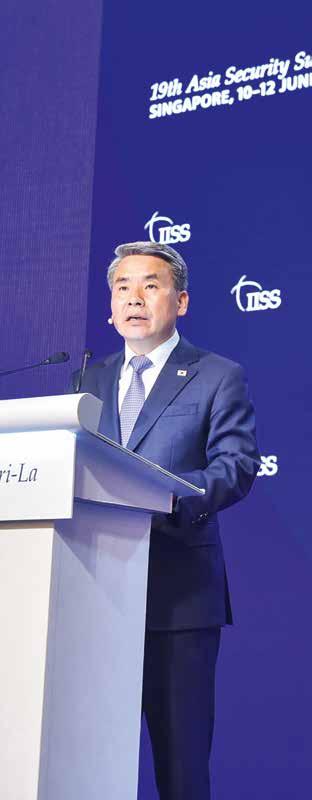

ASIA SECURITY SUMMIT SINGAPORE, 10–12 JUNE 2022
Sunday 12 June 2022, 09:30
Lee Jong-sup
Minister of National Defense, Republic of Korea
Kajsa Ollongren
Minster of Defence, Netherlands
Lord Mark Sedwill
Former Cabinet Secretary and National Security Adviser, Cabinet Office, UK
Republic of Korea (ROK) Defense Minister Lee Jongsup focused his remarks on the denuclearisation of North Korea and the intentions of the newly formed South Korean government to play a responsible role for freedom, peace and prosperity beyond the Korean peninsula as a ‘global pivotal state’. Lee highlighted Pyongyang’s nuclear and missile programmes as one of the major risks threatening stability in the Indo-Pacific.
He also outlined his government’s approach to securing peace on the Korean peninsula through the North’s denuclearisation. Should Pyongyang make substantial progress in denuclearisation, the South Korean government under President Yoon Suk-yeol would pursue a ‘bold plan’ that would yield ‘groundbreaking improvements’ for North Korea’s economy and standard of living. In order to pursue these objec tives from a position of strength, Seoul would also strengthen its own capabilities as well as its security cooperation with allies and partners.
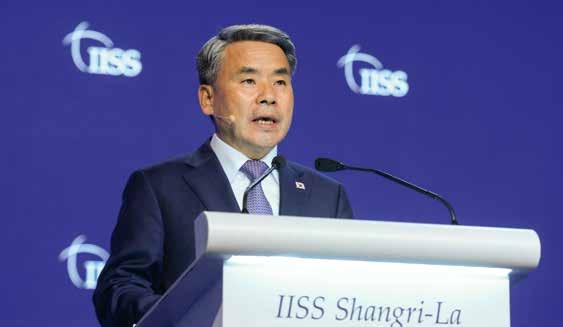
Lee mentioned several initiatives to showcase the ROK’s commitment to play a global role. These include expanding security cooperation with ASEAN member states, including on non-traditional security threats and on defence–industry cooperation with a view towards strengthening regional maritime-secu rity capabilities. The ROK would expand security cooperation with other nations, including European ones, on traditional and non-traditional security, as well as expanding cooperation with security consul tative bodies such as the Quad. Finally, the minister noted that the invasion of Ukraine is not justified under any circumstances.
Kajsa Ollongren, the Minister of Defence of the Netherlands, began by passing on the regrets of EU High Representative Josep Borrell that COVID19 had forced him to cancel his appearance, noting that she would also be delivering his key messages in her speech. Condemning Vladimir Putin’s war
against Ukraine, Ollongren set out how the war has connected Europe and the Indo-Pacific. Russian aggression poses a ‘global challenge with global ramifications’, she said. She also stated that the way the international community responded would affect ‘not just the stability and security of Europe’, but also the ‘future of the rules-based international order’.
Ollongren observed ‘a paradigmic shift’ has occurred in Europe, where countries are ‘recognising global threats using a 360-degrees approach’. The defence min ister also argued that the lessons European countries are drawing from the war against Ukraine would ultimately ‘strengthen European armed forces’ and make them ‘better partners’ for security cooperation with ASEAN. Ollongren noted that Putin’s actions have ‘woken up’ the EU to its geopolitical role and the importance of defence cooperation. European nations are increasing defence budgets and have adopted the EU Strategic Compass as their operational guide to develop the EU into a stronger and more capable security provider.
The EU Indo-Pacific security strategy also provides a foundation for the body to develop cooperation with Indo-Pacific partners. Ollongren highlighted the par ticipation of a Dutch frigate as part of the UK Carrier Strike Group 2021 (CSG21) deployment to the region. In addition, she revealed that the Netherlands has planned to send a warship to the Indo-Pacific once every two years.
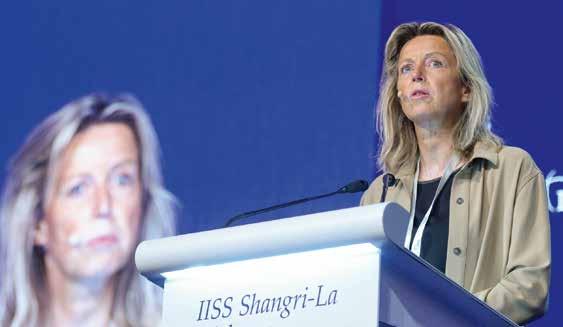
Lord Mark Sedwill, former cabinet secretary and national security adviser of the UK, used his remarks to outline how the challenges Europe and the Indo-Pacific face are connected and therefore require collective action. As examples, he cited the threats posed by North Korea’s nuclear and ballistic-missile programmes, as well as the geopolitical crises being caused by Russian aggression in Ukraine through the transmission mecha nism of food and energy insecurity.
He argued that whilst one response to the chal lenges of interconnectivity could be to reverse course and reduce interdependencies, a better option would be to improve resilience by focusing on sound poli cymaking at home while strengthening national capabilities to act collectively and effectively with partners. Lord Sedwill explained how the UK’s Fusion Doctrine sought to do this by applying ‘defence, dip lomatic, development and economic capabilities, national capabilities’ to contribute to London’s defence and foreign policies. He also highlighted the shift to an ‘Allied-by-design’ concept that assumes from the outset deployments alongside allies, as showcased in the CSG21 tour.
Condemning Russia’s invasion of Ukraine, Lord Sedwill argued that the important dividing line is ‘not between authoritarian and democratic states’, but between those who accept the global rule of law, respect the sovereignty of nations and those who do not.
He underlined the UK’s ‘persistent’ and ‘genuine’ commitment to the Indo-Pacific region because it is in its national interest.
He also outlined the UK’s diplomatic, military and economic engagements in the region, alongside its institutional engagements including the Five Powers Defence Agreement, AUKUS and the UK’s new struc tured dialogue with ASEAN. Lord Sedwell highlighted technical cooperation as a new approach to indus trial and defence, where the UK is moving to a new approach of ‘genuine co-design and co-production’ that includes allies and partners in the Indo-Pacific. Finally, he underscored the importance of alliances and partnerships, which he identified as something which their adversaries do not enjoy.
The subsequent discussion largely focused on exploring further the co-dependencies between the Euro-Atlantic and Indo-Pacific theatres.
Dr Benjamin Schreer, IISS–Europe Executive Direc tor, questioned whether European powers needed to reassess their responses to the China challenge. Dr Chikako Ueki, Professor of International Relations at Waseda University, picked up Minister Lee’s reference to improving ROK–Japan relations and asked regard ing the kind of military capability that better bilateral
cooperation would deliver. Similarly, Mariko Togashi, IISS Research Fellow for Japanese Security and Defence, asked how ROK–Japan bilateral issues could be put aside and how relations can be improved.
Several questions focused on the role of NATO in the Indo-Pacific. Dr Bastian Giegerich, IISS Director of Defence and Military Analysis, asked what NATO’s new Strategic Concept should credibly say on the Indo-Pacific. Senior Colonel Zhang Chi, an associate professor from China’s National Defense University, enquired about the ROK’s cooperation with NATO and whether the Alli ance’s engagement in the Indo-Pacific risked bringing conflict to Asia or undermining ASEAN centrality.
On the Russia–Ukraine war, John Raine, IISS Senior Adviser for Geopolitical Due Diligence, queried what deterrence constitutes at present given the failure to deter Russia’s invasion of Ukraine. Others questioned the future engagement of European partners in the Indo-Pacific. Marianne Péron-Doise, Senior Research Fellow from France’s Institute for Strategic Research at Military School, asked whether the EU would be able to sustain its level of naval presence in the region
Regarding North Korea’s nuclear and missile pro grammes, Sebastien Falletti , China Correspondent of France’s Le Figaro , asked whether Lee’s support for US extended nuclear deterrence includes the possibility of the return of some US nuclear assets to the Korean Peninsula.
The IISS Shangri-La Dialogue
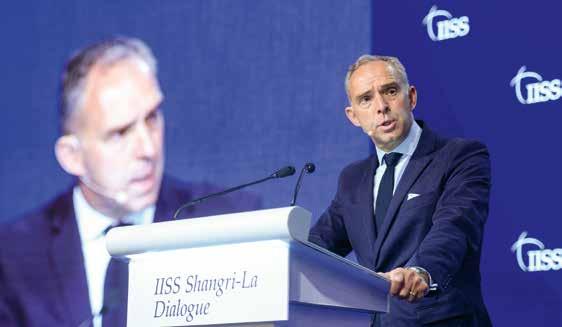
In their responses, Ollongren and Lord Sedwill both addressed questions on NATO. Lord Sedwill noted how Russia’s invasion of Ukraine has shifted the strategic picture in Europe to greater consider ation of not just deterrence but defence. Both speakers concluded that, even as NATO remains a defensive alliance focused on the North Atlantic theatre, Alliance members have a global outlook that means consider ing global threats, and that involved working with partners around the globe. Ollongren insisted that European engagement in the Indo-Pacific is sustain able precisely because the issue at hand is the future of the international rules-based order, and so the dynamic is to do more, not less.


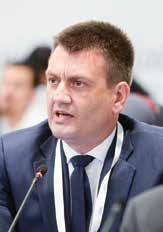

Minister Lee noted North Korean preparations for their seventh nuclear test and ongoing efforts to deter this. He emphasised Seoul’s commitment to denuclearis ing the Korean peninsula by ensuring that the costs of possessing these weapon systems are far outweighed by the benefits North Korea can achieve by denuclearis ing. It is in this spirit, he said, that ROK–Japan security cooperation would be further developed. Lee noted that nobody wants to see any nuclear weapons on the Korean peninsula from any country. Looking forward to the Indo-Pacific strategy of the new ROK government, he said that it would focus on upholding the rules-based international order, as well as peace, freedom and pros perity in the Indo-Pacific.
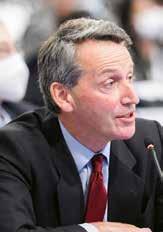
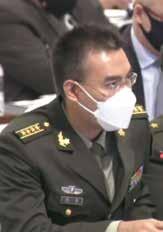
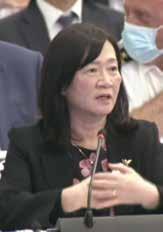

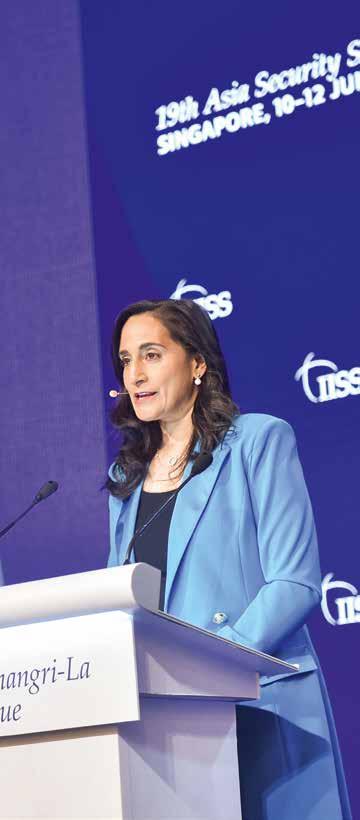

19TH ASIA SECURITY SUMMIT SINGAPORE, 10–12 JUNE 2022
Sunday 12 June 2022, 11:30
Anita Anand
Minister of National Defence, Canada
Inia Batikoto Seruiratu
Minister for Defence, National Security and Policing, Fiji
Dr Ng Eng Hen
Minister for Defence, Singapore
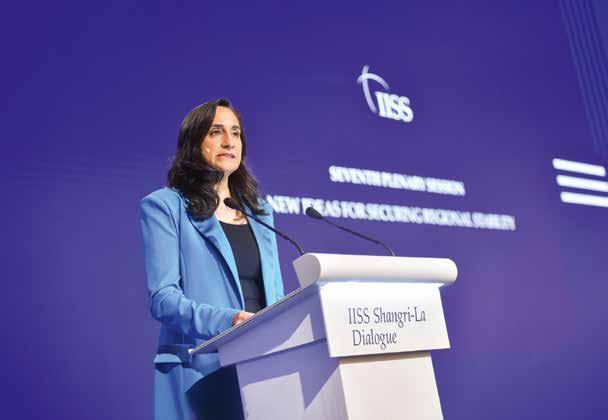 Anita Anand, Minister of National Defence, Canada
Anita Anand, Minister of National Defence, Canada
The final session focused on policy responses to a wide range of regional security challenges – both traditional geopolitical threats made more urgent by Russia’s invasion of Ukraine and non-traditional ones like climate change.
Canadian Minister of National Defence Anita Anand reaffirmed the centrality of responsible engagement – underpinned by the principles of trans parency, open communication and adherence to rules and norms – to Canada’s foreign policy. She set out three ways that Canada’s Indo-Pacific policy reflects this approach.
Firstly, Anand described Canada’s significant and growing military presence in the region. This includes Operation Neon which monitors UN sanctions against North Korea, and Operation Projection which deploys warships to conduct joint missions with allies and partners. Operation Projection is set to return in late 2022, with HMCS Winnipeg, HMCS Vancouver and
Secondly, Anand characterised multilateralism as a ‘cornerstone’ of Canada’s approach to the Indo-Pacific. The minister noted that Ottawa is deepening its mul tilateral engagement with the Indo-Pacific region to maintain the rules-based order against Chinese actions involving coercive diplomacy, cyber activity and intel lectual-property theft. Expressing Canada’s belief in the centrality of ASEAN as a ‘vital forum for address ing regional challenges’, Anand stated that Canada has applied to become a full Strategic Partner of ASEAN. It has also sought membership of ADMM+, where it could contribute, in particular, expertise in combating climate change.
Thirdly, Anand revealed that Canada is devel oping an Indo-Pacific strategy to integrate its diplomatic, military and economic activities and advance responsible engagement. A new Indo-Pacific
Advisory Committee of private sector, civil society and former members of government would support preparation of the strategy. The minister concluded by underscoring Canada’s openness to new and inno vative approaches to work with Indo-Pacific partners to enhance the region’s security.
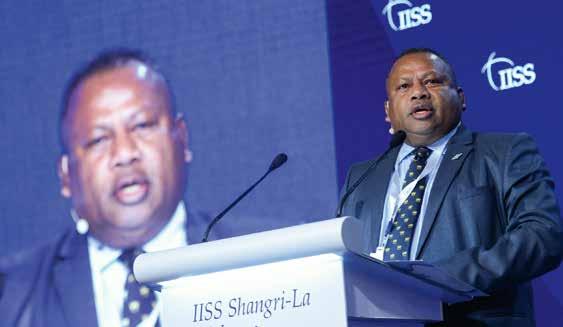
Inia Batikoto Seruiratu, the Minister of Defence, National Security and Policing of Fiji, drew attention to non-traditional security threats. He noted, in par ticular, that a series of devastating tropical cyclones and storms have driven home the existential threat of climate change. The minister also stated that the COVID-19 pandemic has not only shown the centrality of health to national and regional security, but has also prompted the need for new partnerships and new ways of working to counter the spread of misinformation.
Seruiratu revealed that Fiji is drafting a national security strategy to develop a whole-of-government approach to protect its people against a broad range of security threats. He also stated that the country is exploring the use of cross-agency and community partnerships to develop new surveillance and earlywarning mechanisms. He concluded by exhorting other countries and institutions in the region to assist Fiji in its challenges, especially in information sharing and capability development.
Dr Ng Eng Hen, Singapore’s Defence Minister, noted that Russia’s invasion of Ukraine is a ‘geopolitical
earthquake’ that raises risks to peace and stability eve rywhere. He noted that the impact on wheat, fuel and metals markets is deepening existing divisions. Coun tries are shutting down food exports to protect their domestic supply. Consequently, inflation and supply shocks are jeopardising affordability of basic commod ities for the world’s poor. Dr Ng also cautioned that this inward turn risks undermining responses to global challenges such as climate change, human trafficking and terrorism. He observed that security alliances are hardening and defence spending is rising in Europe and the Asia-Pacific.
Dr Ng asserted that the world is standing at a ‘poten tially dangerous point in our history’. He proposed two ways to avert the disaster. Firstly, he stated that it is important to end the war in Ukraine. A protracted war would impose severe costs on Russia and test interna tional support for Ukraine. Secondly, the minister also called upon Asian countries to follow Ukrainian Presi dent Zelenskyy’s advice of pre-emption and prevention of conflict by ensuring that regional tensions do not break out into open conflict. Dr Ng emphasised that tensions should not be framed as part of an ideological struggle between autocracies and democracies.
Dr Ng further noted that the Asian consensus on the respect of sovereignty and territorial integrity alone is not sufficient. The core issue is the interde pendence within the region, which he noted is far
more ‘developed, productive and mutually benefi cial’ than between Russia and Europe. To this, Dr Ng highlighted the importance of strengthening exist ing establishments such as the ADMM+ and enhance engagements within and with extra-regional powers. He noted that building confidence and strategic trust in one another through inclusivity and multilateralism is ‘the call of pre-emption’. Furthermore, Dr Ng sug gested that ADMM+ could continue to build norms and mechanisms to de-escalate and avert conflict, including confidence-building initiatives such as the Code for Unplanned Encounters at Sea and the Guide lines for Air Military Encounters.
Many questions addressed the role of external powers in the Indo-Pacific region. Boris Ruge, ViceChairman of the Munich Security Conference, asked what European states could do to help prevent con flict in Asia. Dr Lynn Kuok, IISS Shangri-La Dialogue
Senior Fellow for Asia-Pacific Security and Co-Editor of the Asia-Pacific Regional Security Assessment, asked how the Russia–China joint statement of 4 February has impacted Beijing’s influence in the region. James Crabtree, IISS–Asia Executive Director, asked how Canada’s Indo-Pacific strategy would be distinc tive from those of other states. Nicholas Childs, IISS
The IISS Shangri-La Dialogue
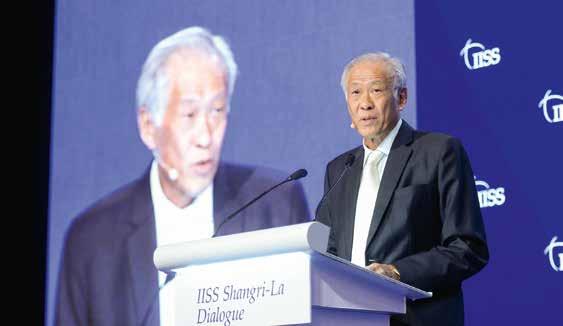
Senior Fellow for Naval Forces and Maritime Secu rity, asked how Canada would balance its Pacific, Atlantic and Arctic commitments.
Several other questions were addressed to Seruiratu. Josh Rogin, Columnist of the Washington Post, asked how Fiji views US–China rivalry. Dr Euan Graham, IISS Shangri-La Dialogue Senior Fellow for Asia-Pacific Security, asked what threats geopolitics poses to Fiji. Darshana Baruah, Fellow of the South Asia Program at the Carnegie Endowment for Inter national Peace, asked how Fiji manages the differing security perspectives of large and small states.
Other questions explored Singapore’s policy think ing. Dr Chong Ja Ian, Associate Professor of Political Science at the National University of Singapore, asked how Singapore is addressing disinformation. Dr Tim Huxley, IISS–Asia Senior Adviser and its former execu tive director, asked what implications Russia’s war in Ukraine hold for Singapore’s security doctrine and plan ning. Sofie Syarief, a journalist and news producer from Kompas TV, asked how Singapore could help ASEAN address problems relating to the South China Sea. Senior Colonel Zhao Xiaozhuo of the Chinese Academy of Military Sciences asked Dr Ng to assess the role that the Shangri-La Dialogue plays in Asia-Pacific security.
In response, Anand emphasised that Canada pri oritises the combating of climate change, and that its armed forces have already addressed disasters
emanating from this problem. The significance of Can ada’s Pacific trade, and of Asian diasporas in Canada, would also shape its forthcoming Indo-Pacific strat egy. She noted the growing importance of defending Arctic sovereignty, including through close coopera tion with the US.
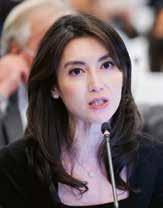
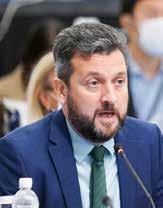

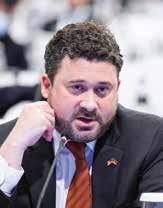
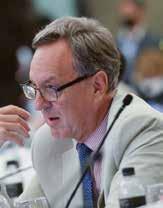
Seruiratu emphasised the challenges facing a small state manoeuvring a changing geopolitical climate. He noted that a US China clash would be disastrous, and that Fiji has an interest in the development of good relations between the two great powers. He asked whether China’s growing influence is the result of a vacuum created by the US, and noted that China is now a key development partner of Fiji. Seruiratu also emphasised that Fiji seeks long-term relationships based on trust with all its traditional partners.
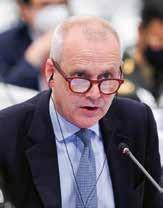
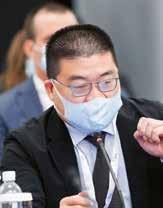
Dr Ng responded that the most important thing European states could do for Indo-Pacific stability is to establish a security presence. The open policy of Singapore’s Changi Naval Base to port visits facilitates this. He noted that the crisis in the Black Sea could be replicated in the South China Sea and called for the South China Seas Code of Conduct to be finalised quickly to avert disaster. Dr Ng also mentioned that the Singapore Armed Forces are setting up a digital intelligence service to tackle disinformation. He drew attention to both the extent and limits of the SinoRussian relations, while observing that strategic allies could become strategic burdens. Lastly, he pointed out that it is for China to decide whether it is better to participate in an open, unscripted platform that posed many questions, or to retreat from engagement.
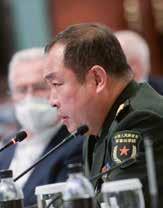



The first roundtable at the fifth Southeast Asian Young Leaders’ Programme
The fifth Southeast Asian Young Leaders’ Programme (SEAYLP) returned with its strongest cohort yet of aca demics, analysts, politicians, officials and journalists. The 27 delegates hailed from all ten ASEAN member states. Ten additional delegates from the Australia, China, India, Japan, Norway, the UK and the US joined the programme as guests; and for the first time, SEAYLP featured represen tation from four island nations: Fiji, Papua New Guinea, the Solomon Islands and Timor-Leste. In line with the pro gramme’s longstanding commitment to gender diversity, 20 of the 41 young leaders were women. SEAYLP 2022 was funded by the Australian government, the Special Competitive Studies Project, Google Asia-Pacific and the Royal Norwegian Ministry of Foreign Affairs.
The Southeast Asian Young Leaders Programme began on the morning of Friday, 10 June with an intro duction to the Shangri-La Dialogue given by Dr John
The IISS Shangri-La Dialogue
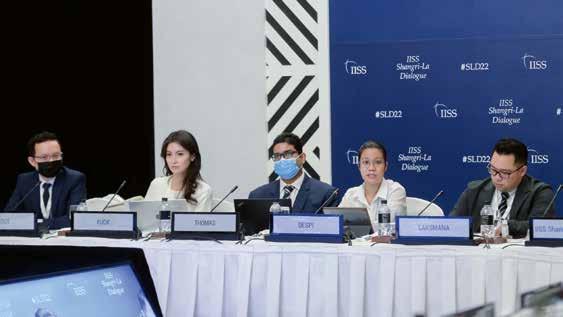
Chipman, IISS Director-General and Chief Executive. He discussed how the SLD came about and what the IISS has hoped to achieve in convening the Dialogue over the past 20 years, later taking questions from young leaders on these issues.
Over the next several hours, as the common areas in the hotel began to hum with anticipation of the first Dialogue since 2019, the young leaders participated in three roundtable discussions on regional security issues. IISS Shangri-La Dialogue Senior Fellow for Asia-Pacific Security and Co-Editor of the Asia-Pacific Regional Security Assessment, Dr Lynn Kuok, mod erated the first discussion on the South China Sea (SCS) disputes. Panellists from Indonesia, Malaysia, the Philippines and Vietnam each spoke about their respective countries’ approaches to Chinese SCS expansion, emphasising their political and economic security imperatives.
Captain Dianne Despi noted that the Philippines has sought to diversify its partnerships and pursue
A SEAYLP discussion moderated by IISS Shangri-La Dialogue Senior Fellow for Asia-Pacific Security and Co-Editor of the Asia-Pacific Regional Security Assessment, Dr Lynn Kuok
more consistent naval modernisation. Vietnam’s Dr Phan Hao Duy raised the possibility of ASEAN states coming to a common legal position on issues of agree ment. Thomas Benjamin Daniel explained how Malaysia has compartmentalised the SCS dispute from the rest of its relations with China out of necessity. Dr Evan Laksmana argued that Indonesia has failed to respond to Beijing’s actions in the South China Sea as a non-claimant state without a framework for integrating responses across its institutions. In the open discus sion that followed, delegates focused on questions of international law, the role of maritime-domain aware ness, and the possibility of settling disputes amongst ASEAN member states before negotiating with China.
The second SEAYLP roundtable discussion, mod erated by IISS Senior Fellow for Southeast Asian Politics and Foreign Policy Aaron Connelly, focused on challenges to ASEAN centrality. Pich Charadine of Cambodia outlined the political, strategic and economic goals of ASEAN. She also raised its noninterference dilemma and whether it can remain relevant amidst the new regional frameworks which do not have ASEAN at their centre, like the Quad and the Belt and Road Initiative
Julio Amador III of the Philippines argued that ASEAN has not lived up to its claims to centrality, sug gesting that member states review the ASEAN Charter. If the grouping does not strengthen its institutions,
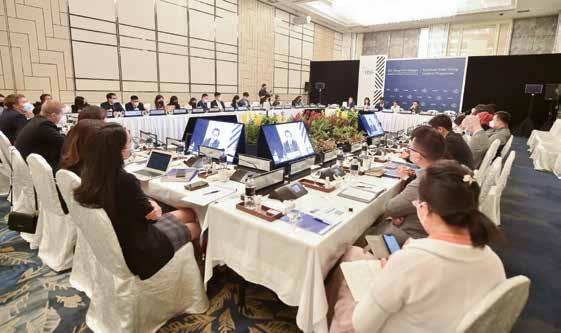
he argued, other institutions would fill the strategic vacuum left by its shortcomings. Fuadi Pitsuwan of Thailand defended the relevance of ASEAN central ity in today’s geopolitical environment and discussed internal and external challenges. He proposed that ASEAN nations show more ambition rather than accepting middle-power status. Interventions from the floor focused on the challenges of the South China Sea, Myanmar, and great-power rivalry.
A final panel, moderated by IISS Research Fellow for Security and Technology Yuka Koshino, consid ered the role of governments, businesses and other stakeholders in managing technological competi tion and security standards for regional prosperity, highlighting Southeast Asian, American and Chinese perspectives. Tiana Desker of Singapore outlined the perspective of small states in using existing multilat eral platforms to strengthen norms and national-level governance to build norms where they do not yet exist and noted the key role of great powers in arms control and strategic stability.
Brandon McKee of the United States discussed tech nological competition in terms of ideological rivalry between the US and China. Dr Yu Jie of China framed technological competition in terms of opposing narra tives on international standards-setting and encouraged countries to come together harmoniously. She pointed out China’s own challenges in grappling with new
technologies and the impact of China’s domestic policy on its foreign economic and technological policy.
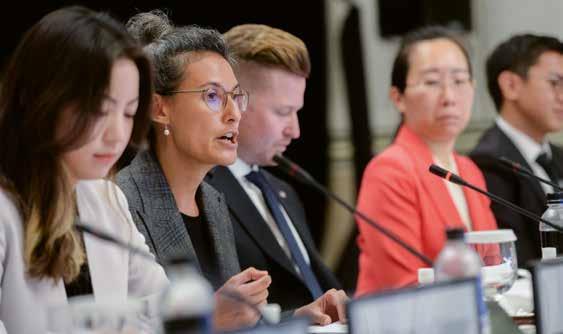
Ryan Rahardjo of Indonesia offered a privatesector perspective, explaining Google’s approach of ‘responsible development’ to artificial intelligence, including principles of social benefit, risk manage ment, elimination of bias, privacy and company redlines. In the discussion that followed, delegates focused on the question of whether Southeast Asian states needed to make a choice between American and Chinese technology, or if they could hedge by taking advantage of the competition between the two.
SEAYLP delegates asked some of the most impor tant questions fielded in the SLD plenary sessions. Bich Tran of Vietnam asked Vietnamese Minister of National Defence Phan Van Giang how Vietnam plans to diversify its defence supply chain given an increas ing recognition amid the Ukraine war that it has relied too heavily on Russia. She also asked Chinese Minister of National Defense Wei Fenghe whether the People’s Republic would commit to respecting the territorial integrity of neighbours like Vietnam, noting that it did not do so in the past. Chansambath Bong of Cambodia asked Cambodian Minister of National Defence Tea Banh about the purpose of the Royal Cambodian
Armed Forces’ new missile corps, a development which otherwise might have passed notice in the discourse.
SEAYLP delegates made important contributions to the discussions during special sessions on the afternoon of Saturday, 11 June. In the special session on climate change and green defence, Pia Ranada of the Philippines asked how the defence sector could prepare for an increas ing number of climate refugees. In the special session on Myanmar, Pongkwan Sawasdipakdi asked panellists to address the ‘elephant in the room’ – the close relationship between the Royal Thai Army and the Myanmar armed forces – and whether Thailand could be doing more to persuade the Myanmar’s junta to end the crisis.
SEAYLP delegates from guest countries made their presence known as well. Darshana Baruah of India raised Franco-Australian tensions with French Minister of the Armed Forces Sébastian Lecornu. In the final plenary featuring Fijian Minister of Defence Inia Seruiratu, Baruah noted the difference in pri orities between small island states focused on climate change and great powers focused on geopolitics. She also raised the increased presence of the Chinese navy in the Indian Ocean in the special session on maritime security. Natalie Sambhi of Australia asked Indonesian Minister of Defence Prabowo Subianto about the AUKUS partnership in light of his com ments about an ‘Asian Way’ of security; while Daisuke Kawai of Japan asked Japanese Minister of Defense
Kishi Nobuo about changes to Japanese defence policy under the new Kishida government.
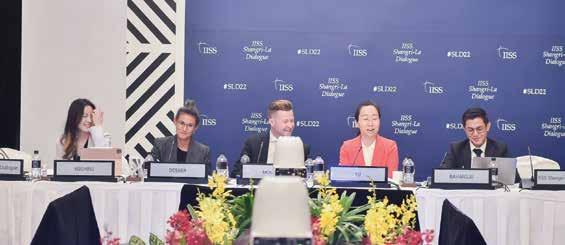
Southeast Asian Young Leaders’ Programme delegates also had the opportunity for exclusive engagements with senior defence leaders over meals during the Dialogue. Australian Deputy Prime Minister and Defence Minister Richard Marles, on his first day abroad since being sworn in three weeks earlier, joined the delegates for lunch on Friday, 10 June, where he spoke about the new Australian government’s approach to the region. In the candid yet thoughtful exchange that followed, Marles answered questions about the Quad, the crisis in Myanmar, Australia–Indonesia relations and Australia’s ‘redlines’ in its relationship with China.
Delegates also enjoyed off-the-record discussions with Admiral John Aquilino, the Commander of US Indo-Pacific Command, over breakfast on the morn ing of Saturday, 11 June and with Singapore’s Foreign Affairs Minister Vivian Balakrishnan over lunch on the afternoon of Sunday, 12 June. Despite coming at the end of a full three days of activities, interest in the discussion with Minister Balakrishnan was high, with nearly all delegates raising their hands when the floor was opened to questions.
After a full day of discussions on weighty issues, on the evening of Saturday, 11 June, SEAYLP delegates visited the residence of the Australian High Commissioner to Singapore, Will Hodgman, for dinner and an oppor tunity to carry on the day’s discussions in an informal
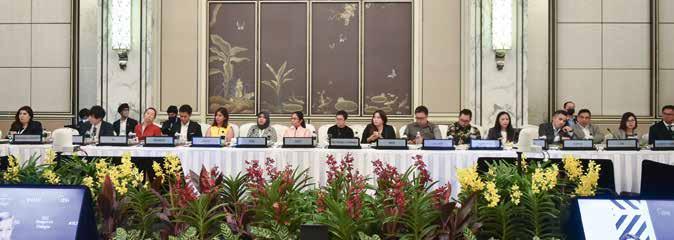
setting. Briefly interrupting the festivities, the thensecretary of the Australian Department of Foreign Affairs and Trade, Kathryn Campbell, congratu lated the delegates on their selection and noted that she was particularly pleased, as a retired brigadier in the Australian Army, to see so many young women among them.
The bonhomie continued the following after noon when the delegates travelled to the residence
of the Royal Norwegian Ambassador to Singapore, Eivind Homme, for a closing reception following the conclusion of the Dialogue. Over the course of a beau tiful afternoon, the young leaders enjoyed Norwegian food, drinks and hospitality as well as each other’s company before beginning their journeys home— taking with them new relationships from across the region, and new ideas for collaboration on issues of common concern.
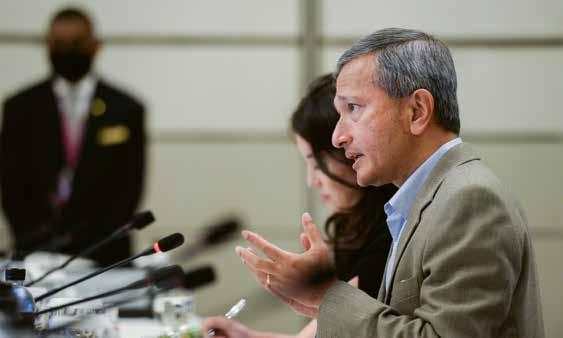



Special Address from Ukraine’s President, Volodymyr Zelenskyy
The 19th Shangri-La Dialogue returned to a global audi ence following a two-year hiatus. Convened by the IISS, the world’s media and key opinion formers on security issues in the Asia-Pacific region gathered at the Dialogue in Singapore. Together, they led the news and drove key con versations online, communicating to their readers, viewers and followers the complexities, subtleties and advantages that in-person diplomacy can provide to an increasingly insecure region.
The SLD was much talked about online. Speeches and coverage from the plenary and special sessions – and all the events which have happened behind the scenes in Singapore – generated over 22,000 unique mentions on social media over the weekend the event was held. These social conversations reached nearly one billion people, with most of the online dialogue happening in the US, Australia, Japan and the rest of Asia. Plenary speakers and delegates tweeted and retweeted SLD-related content.
We leveraged our IISS YouTube channel to ensure global audiences could watch the plenary sessions live online. In addition, the plenary recordings have so far generated over 100,000 views. Our YouTube playlists also include expert opinions to engage our audiences with prime IISS analysis preceding the Shangri-La Dialogue as well as after day one in Singapore. The most viewed videos include:
• ‘IISS Shangri-La Dialogue 2022: Managing Geopolitical Competition in a Multipolar Region’ (nearly 50,000 views)
• ‘IISS Shangri-La Dialogue 2022: China’s vision for regional order’ (almost 24,000 views)
• ‘Special Address from Volodymyr Zelenskyy, President, Ukraine’ (over 13,000 views)
The IISS website is a key communication channel and pro vided information such as speaker agendas and content related to themes and topics of the Shangri-La Dialogue 2022. It also offers customised landing pages for both the special sessions and the Southeast Asian Young Leaders’ Programme. Throughout the event, the website was
updated with live streams and additional information. Transcript downloads and recordings were added on a rolling basis and promoted via our social media channels. The bespoke web pages were viewed over 60,000 times during the week of SLD 2022.
The IISS website also included a link to our IISS Flickr account with highlights from the event.
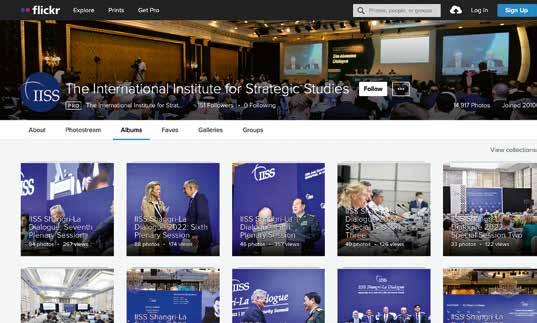
Flickr Images were updated on a rolling basis and used by regional and international media outlets such as Nikkei Asia.
Our social media and website activities were com plemented by a special pre-event podcast episode ‘It’s Back: IISS Shangri-La Dialogue 2022’, which has been downloaded over 2,000 times globally. Guest host James Crabtree, IISS–Asia Executive Director, was joined by col leagues Meia Nouwens, Senior Fellow for Chinese Defence Policy and Military Modernisation; and Aaron Connelly, Senior Fellow for Southeast Asian Politics and Foreign Policy, to discuss themes and topics of the upcoming event.
• The focus of the episode’s discussion includes:
• US–China relations
• Southeast Asia and regional security
• The impact of the war in Ukraine
• Europe and the Indo-Pacific
IISS blog posts published before SLD 2022 highlighted themes and topics of the event, and they have been viewed over 3,000 times across regions. Some of the more popular posts include:
US–China tensions to centre stage at the IISS Shangri-La Dialogue 2022 by James Crabtree
Delegates are gathering in Singapore to attend the region’s premier defence summit, which will serve as a rare
opportunity for the United States and China to discuss a long list of disagreements and topics of common concern.
Divisions in the Indo-Pacific over Russia’s invasion of Ukraine by Samir Puri
Indo-Pacific governments reacted to the Russian inva sion of Ukraine in three ways – quickly offering opposition, ambivalence or support – and have held fast to these posi tions as the war has evolved. This issue will be central to the debates held at the IISS Shangri-La Dialogue, beginning 10 June, about how the Ukraine war will affect regional eco nomic relations and security and defence affairs.
The Ukraine war and the new meaning of security guarantees for the Indo-Pacific by John Raine
The 2022 IISS Shangri-La Dialogue will convene on 10 June against the backdrop of a war in Europe. The conse quences of the war for Euro-Atlantic security have been profound, but how – if at all – will they affect the security architecture of the Indo-Pacific?
The International Institute for Strategic Studies wel comed over 200 members of the media to the Shangri-La Dialogue this year, representing 60 news organisations from across the world. Their coverage appeared in Asian, North American and European publications, reaching hundreds of millions here in this region and the world.
Bloomberg, the Financial Times, BBC, CNBC, CNN, NHK, Channel News Asia, Associated Press, Reuters and many more have reacquainted the world with this vital process of defence diplomacy. What follows is a selection of key news articles and opinion pieces relating to events at the Dialogue:
Selected press coverage
SINGAPORE — While appealing to Asian nations for sup port to fend off Russia’s invasion on Saturday, Ukrainian President Volodymyr Zelensky said the international com munity should help Taiwan resist China’s aggression now, before Beijing attacks the island democracy it claims as its own province.
The comments risk upsetting Ukraine’s delicate balanc ing act with China; nevertheless, Zelensky insisted that aggressors must be confronted wherever they emerge. Asian countries must not wait for the crisis to act on Taiwan’s behalf, which would be repeating the mistake Europe made before Russian President Vladimir Putin’s attack on Ukraine.
Zelensky’s remarks followed a video address he made to the Shangri-La Dialogue, an annual conference of Asian and Pacific defense and diplomatic officials organized by the London-based International Institute for Strategic Studies. Zelensky told the assembled dignitaries that the Ukraine crisis was an urgent issue not just for Europe, but for Asia as well. He warned countries sitting on the sidelines they would soon face food, energy and economic crises unless Putin was quickly defeated.
Following his prepared remarks, I asked Zelensky what advice he had regarding Taiwan, which is facing a similar (although not yet violent) campaign of economic and mili tary coercion from its neighbor, China. He responded that Ukraine provides a lesson for the international community: that it should come to the aid of countries facing aggression before war breaks out.
“No one benefits from [war], apart from certain politi cal leaders who are not content with the present level of their ambitions. Therefore, they keep growing their appe tites, their ambitions,” Zelensky said, without mentioning Chinese President Xi Jinping by name. “The world enables these leaders to grow their appetites for now, therefore we need a diplomatic resolution to support countries that are in need of help.”
The Ukraine example shows that once violence breaks out, the human costs are staggering, Zelensky said, so every effort must be made to find a diplomatic solution to avoid outright conflict, if possible. But at the same time, he said, the international community must intervene before ten sions spill over into violence to ensure a smaller country can stand up to an aggressor.
“We must not leave them behind at the mercy of another country which is more powerful in financial
terms, in territorial terms and in terms of equipment,” Zelensky said. “And therefore, if there is a way out diplo matically, we need to use the diplomatic way. But it must be a preemptive way, not the one that comes after the war has started.”
Zelensky’s remarks represented the most assertive defense of Taiwan and its right to exist that he or any member of his government has made to date. Since the Russian invasion began, the Ukrainian government has been careful not to run afoul of Beijing, which Ukraine sees as potentially both a helpful or harmful actor. China has not condemned Russia’s invasion of Ukraine and has parroted Russia’s propaganda blaming the West. But Beijing has stopped short of actively supporting the Russian invasion.
The Taiwanese government has been eager to draw simi larities between its situation vis-a-vis China and Ukraine’s suffering at the hands of Russia. But the Chinese govern ment angrily rejects any such comparison, claiming that Taiwan is already part of China and therefore represents an internal matter not subject to any international scrutiny.
Beijing’s sensitivity over the Taiwan issue was on full display at the conference, where U.S. Defense Secretary Lloyd Austin met with China’s minister of national defense, Gen. Wei Fenghe on Friday. According to a U.S. official, Austin confronted Wei about China’s increasing intimida tion of Taiwan, which threatens to upset a long-standing but fragile status quo, and rejected China’s contention that the Taiwan Strait is wholly owned by China.
“We’ve witnessed a steady increase in provocative and destabilizing military activity near Taiwan. And that includes PLA [People’s Liberation Army] aircraft flying near Taiwan in record numbers in recent months — and on a nearly daily basis,” Austin said in a speech Saturday. “Maintaining peace and stability across the Taiwan Strait isn’t just a U.S. interest. It’s a matter of international concern.”
After Austin’s meeting with Wei, China’s defense min istry blamed the United States and “Taiwan independence forces” for upsetting the status quo. Beijing also claimed that Wei had told Austin China would not hesitate to start a war over the issue if necessary and “smash to smither eens any Taiwan independence plot.” U.S. sources told me that Wei never said those things inside his meeting with Austin.
Despite China’s determined efforts to deny that the Ukraine and Taiwan situations are linked, several Asian leaders at the Singapore conference said Russia’s invasion of Ukraine was a wake-up call for the region in terms of a pos sible Chinese attack on Taiwan. As Japanese Prime Minister Fumio Kishida said while addressing the conference Friday evening, “Ukraine today may be East Asia tomorrow.”
©Washington Post Reprinted with permission
Opinion: Zelensky calls for international support for Taiwan before China attacks
A Chinese fighter jet veered in front of an Australian mili tary surveillance aircraft over international waters in the South China Sea last month and released metallic debris that was sucked into the Australian plane’s engines.
No one was reported hurt in the encounter, which Australia’s defense minister called “very dangerous,” but it added to a string of recent incidents that demonstrate China’s growing willingness to test the United States and its partners in Asia militarily.
China has systematically tracked U.S. warships in the region, its air force has staged intensifying incursions into Taiwanese and Japanese airspace, and its coast guard routinely harasses Philippine, Malaysian and Indonesian vessels. In recent weeks, Chinese fighter pilots have repeatedly buzzed Canadian military aircraft on a U.N.sanctioned operation — sometimes raising their middle fingers at the Canadians.
As China’s armed forces grow in strength, sophistication and confidence, U.S.-led military deterrence in the IndoPacific is losing its bite.
Take the United States’ military presence in the region. It has about 55,000 military personnel in Japan and 28,000 in South Korea. Several thousand more are deployed across Australia, the Philippines, Thailand and Guam. This posture has barely changed since the 1950s. But plans to reinvig orate the U.S. presence have been stymied by inadequate budgets, competing priorities and a lack of consensus in Washington on how to deal with China.
The Pentagon has increased investments in cuttingedge technologies like artificial intelligence, and cyber- and space-based systems to prepare for a possible high-tech conflict with China in the 2030s. But the balance of power is likely to shift decidedly in China’s favor by the time they are deployed unless the United States brings new resources to the table soon.
President Biden this year submitted the largest defense budget ever in dollar terms, but much of the increase will be swallowed up by skyrocketing inflation. Mr. Biden, like former President Donald Trump, is thus falling short of a target of 3 percent to 5 percent real annual budget growth, a bipartisan goal set even before the Ukraine war and often cited as the minimum the Pentagon needs in today’s era of great-power competition.
While the U.S. military is globally dispersed, China can concentrate its forces on winning a future conflict in its own neighborhood. It now has the capability. China has
the world’s largest navy and Asia’s biggest air force and an imposing arsenal of missiles designed to deter the United States from projecting military power into the Western Pacific in a crisis. China’s third and most advanced aircraft carrier is nearing completion, and other new hardware is being developed or is already in service.
While much attention is focused on its behavior toward Taiwan, China is building and militarizing artificial islands in the South China Sea. It also broke ground on an expanded naval port in Cambodia last week, which may one day pro vide its first military foothold in another Asian country. A security agreement with the Solomon Islands could lead to something similar, and Beijing is aggressively courting other Pacific nations.
America’s military position in Asia, by contrast, has been hampered by decades of preoccupation with Middle East conflicts. The war in Ukraine has morphed into a long-term $54 billion commitment and forced Mr. Biden to delay and redraft his administration’s National Defense Strategy and National Security Strategy — critical documents that lay out global priorities and resource needs — as officials grapple with how to manage China and Russia at the same time.
Mr. Biden’s team ended the lengthy and costly U.S. involvement in Afghanistan, but that has not freed up many resources for the Indo-Pacific. Washington must not lose sight of the fact that China is a far greater security threat than Russia, now and in the long term.
U.S. Secretary of Defense Lloyd Austin said “the IndoPacific is at the heart of American grand strategy” during a speech last week at the Shangri-La Dialogue defense summit in Singapore, but he offered little in the way of new resources or commitments.
To turn things around, the United States must prioritize the threat from China, reinforce its military strength in Asia and provide Australia, Japan and India more sophisticated military and technological capabilities to bolster a strategy of collective defense.
It should urgently expand the Pacific Deterrence Initiative, which would direct additional spending toward strengthening the U.S. military presence west of Hawaii by distributing forces more widely through the region, improv ing logistics and air defenses, and other measures. These are necessary to reduce exposure of U.S. forces to China’s longrange missiles and increase the locations from which they could operate in a crisis. But this initiative has suffered from insufficient funding and criticism that its top priorities were not being met.
The United States could also strengthen its military pos ture in the region by increasing from five to six the number of attack submarines home-ported in Guam, expanding maritime operations in the Pacific and deploying more advanced fighters, warships, drones and long-range mis siles to the region.
Opinion:
U.S. Is Losing Its Military Edge in Asia, and China Knows It
But all of that may still not be enough. The challenge posed by China is becoming so great that the United States can no longer maintain a balance of military power in Asia by itself.
Washington took a bold first step toward sharing more of the burden through the AUKUS agreement announced last year, under which it will work with Britain to supply Australia with nuclear-powered submarines and codevelop other advanced military technologies in the interim. But the submarines won’t enter service until the late 2030s, and AUKUS’s other collaborative efforts will require difficult reforms to longstanding U.S. restrictions on sharing sensi tive national security technology.
Washington should support Australian and Japanese aims to build long-range missiles on home soil by shar ing intellectual property, provide more U.S. weaponry to India and beef up foreign military financing in the region, starting with a dedicated fund to boost Taiwan’s deter rence capabilities.
America has long neglected its defense strategy in Asia, viewing China’s challenge as important but not urgent. The scenes now playing out in Europe are a stark reminder of what can happen when deterrence fails.
©New York Times
Reprinted with permissionTravels with the defence secretary in quest of stronger ties
Ramrod-straight in a crisp green uniform, General Wei Fenghe, China’s defence minister, saluted the audience before letting rip. “We require the us side to stop smearing and containing China. Stop interfering in China’s inter nal affairs…If you want confrontation, we will fight to the end.” His fire was aimed at the lumbering figure of Lloyd Austin, America’s defence secretary and a former general.
Mr Austin had warned the same gathering that China was becoming “more coercive and aggressive”—militaris ing disputed islets in the South China Sea and provocatively probing Taiwan’s defences. “We will fly, sail and operate wherever international law allows,” Mr Austin insisted. America would continue to sell arms to Taiwan, while “maintaining our own capacity to resist any use of force or other forms of coercion”.
The finger-jabbing worried many of those attending the Shangri-La Dialogue on June 10th-12th, an annual talkfest of ministers, generals and security experts in Singapore held by the International Institute for Strategic Studies, a
British think-tank. “I have a strong sense of urgency that Ukraine today may be East Asia tomorrow,” fretted Kishida Fumio, Japan’s prime minister. The fact that Generals Wei and Austin met to discuss “guardrails”—rules for encoun ters at sea and in the air, and hotlines—was reassuring. But it was also evidence of how fast the rivalry is deepening.
Mr Austin regards the Indo-Pacific, from Hawaii to the Maldives, as “the heart of American grand strategy”. It is where the country deploys the most forces (see chart 1). But can America credibly grapple with a rising China while also striving to repel Russia’s aggression in Ukraine? Yes, avers Mr Austin. “We are walking and chewing gum. We’re able to do that because of the strong network of alliances and partnerships that we have around the globe.” America’s ability to attract friends is a force multiplier (see chart 2), and ever more important as the challenges grow.
To travel with Mr Austin to Asia and Europe this month is to glimpse America’s military might, and how it seeks to harness the “power of partnerships”. He flew on an e4-b, “the Doomsday plane” from which American leaders can wage nuclear war, trailed by a c-17 transporter. Every few hours it was refuelled in mid-air by a daisy-chain of tanker aircraft lurking off the coasts of Alaska, Japan, Arabia and Italy. On the ground Mr Austin met Justin Trudeau, Canada’s prime minister, at an American-Canadian nuclear bunker in Colorado; 20-odd ministers in Singapore; the Thai prime minister in Bangkok; and the defence ministers of 29 NATO allies in Brussels.
Yet not all allies are equal. In Europe America can rely on NATO, whose members are committed to defending each other under Article 5 of the Washington treaty. In Asia China accuses America of trying to recreate NATO—a contention Mr Austin denies. “We do not seek a new cold war, an Asian NATO or a region split into hostile blocs,” he insisted. Rather, America operates with a patchwork of security accords.
America thinks only China can challenge its global supremacy. Yet Russia is consuming much of the country’s attention, and billions of dollars, as America seeks to help Ukraine and strengthen NATO. Despite Europe’s wealth, says Eric Edelman, a former senior Pentagon official, “without the us to organise them, Europeans cannot defend themselves”.
Defence officials justify the priority given to Ukraine by arguing that, were Russia to succeed in taking land by force, it would encourage other autocrats to do the same elsewhere (eg, Taiwan). Many foreign-policy experts think the war in Ukraine, if it results in a defeat for Russia, would strengthen the West’s hand against China.
“Ukraine is facing a pivotal moment on the battlefield,” said Mr Austin, announcing another $1bn in American aid, including more artillery and longer-range missiles—though well short of the amounts requested by Ukraine. He has stopped talking about helping Ukraine “win”. The blurry
The IISS Shangri-La Dialogue
aim is something less—giving it “the means to deter and to defend” itself.
American officials boast that Mr Putin’s war is strength ening NATO: Sweden and Finland want to join. Yet all is not well. Turkey is blocking their accession. And allies are drifting apart over the endgame in Ukraine.
NATO’s summit in Madrid on June 29th-30th will focus on the threat from Russia but will keep an eye on Asia. It will probably be attended by the leaders of Japan, South Korea and Australia. This is not yet the “league of democra cies” that some have dreamed of. But as a Japanese official puts it: “The message is that security in Europe and Asia cannot be separated.”
Despite Mr Austin’s denial, many in America see ben efits in trying to recreate something like NATO in Asia (one such body, the eight-member Southeast Asia Treaty Organisation, was dissolved in 1977). For now, America gets by with what might be called a “non-treaty organisation”: a hub-and-spokes system of bilateral defence agreements with Japan, South Korea, Australia, the Philippines and Thailand, which do not have obligations towards each other. Japan, the weightiest of these, is hamstrung by its tradition of paci fism. Taiwan, the most dangerous flashpoint, has no formal diplomatic relations with most countries, and is excluded from America’s many regional military exercises. “Strategic ambiguity” prevents America from saying clearly whether it would intervene to stop a Chinese invasion.
For want of a more coherent system, America is building a fast-expanding set of ad hoc projects—a “networked secu rity architecture”, as one official puts it. The “Five Eyes” (with Australia, Britain, Canada and New Zealand) share intelligence; AUKUS (with Australia and Britain) is devel oping nuclear-powered submarines and other weapons; and the Quad (with Australia, India and Japan) discusses everything from vaccines to maritime security.
In Singapore Mr Austin prodded Japan and South Korea to hold three-way exercises on missile defence, spurred by North Korea’s missile tests. With Japan and Australia, he pushed for more complex war-games and co-operation on defence technology. The result, says Tanvi Madan of the Brookings Institution, a think-tank in Washington, is unusual: “It’s not hub-and-spokes. It’s not NATO. It’s a spider’s web.”
This web may not be strong enough to contain China. Much depends on Japan. Mr Kishida promised a “substan tial” rise in defence spending, though he did not commit himself to reaching 2% of GDP, NATO’s benchmark. A law from 2015 provides more leeway to help allies. Japan and Australia have signed a deal allowing them to station troops in each other’s countries. A new national-security strategy later this year may push things further.
India, the world’s largest democracy, is the trophy in America’s quest for stronger alliances. It is increasingly
at odds with China. Its help in controlling the Strait of Malacca would be invaluable in any war with China. The Quad, which has started meeting at the level of leaders, seeks gradually to draw India in. Yet India is wary of an alliance, and remains close to Russia, which supplies a lot of its weapons.
Another prize is ASEAN, the ten-country South-East Asian club. It includes fence-sitters such as Indonesia. “We do not believe in alliances that could in the end threaten other countries,” said Prabowo Subianto, its defence minis ter. Indonesia holds drills with America but does not want to upset a “benevolent” China.
America has pursued softer forms of collaboration, such as helping Asian governments to police their waters, not least against Chinese illegal fishing. An American coast guard cutter will be deployed to the region. A Quad summit last month promised to help Indo-Pacific countries improve “maritime domain awareness” by sharing information on ships at sea. A Chinese military source was scathing: “Monitoring fishing vessels means also monitoring military ships,” he said.
Ashley Townshend, of the Carnegie Endowment, an American think-tank, argues that America is still not doing enough in Asia. A mutual-defence treaty between the closest allies—America, Australia and Japan—could antagonise South-East Asian countries. Better to create a joint military command between them, Mr Townshend argues: instead of a NATO-like treaty in Asia, a small NATO-like military structure.
The great game in Asia is in full swing. Many in America are only dimly aware of it. On Mr Austin’s e4-b, the screens streaming American news channels barely noticed his globe-spanning defence diplomacy. They were offering competing views of the Capitol-riot hearings, guns and more. Which raises a nagging question: does an America so polarised at home have the will to sustain its dominance abroad?
©The Economist Reprinted with permission
Nikkei Asia 11 June 2022
After 2-year hiatus, Shangri-La Dialogue returns with a bang
SINGAPORE -- Bearing stars and crests on shoulders, high-ranking military personnel decked in a spectrum of colors -- green, gray, brown and white -- paced hurriedly across the hallways of the sprawling Shangri-La Hotel in
Selected press coverage
Singapore on Saturday, skillfully navigating cordons and checks by security personnel.
The last time the Shangri-La Dialogue took place in person in 2019, the Quad leaders had never held a summit, and frameworks such as AUKUS -- the new U.S., U.K. and Australia grouping -- and the Indo-Pacific Economic Framework -- U.S. President Joe Biden’s attempt to deepen economic engagement in the region -- did not exist.
Hosted by the U.K.’s International Institute for Strategic Studies, the dialogue has traditionally been a forum to dis cuss regional security issues in the Asia Pacific -- and an annual platform for U.S. and China to project their views.
But the event took a new turn this year after the Russian invasion of Ukraine. The single biggest topic on partici pants’ minds, whether they were from the East or the West, was just how the Ukraine war will impact the Indo-Pacific region. Perhaps the sense of urgency was the reason for all the fast walking.
On Saturday, over 570 delegates including top defense officials attended the highlight of the three-day summit: a virtual appearance by Ukrainian President Volodymyr Zelenskyy. From the capital Kyiv, the leader warned of the spillover effects of the invasion to other regions.
“We must break the ability of Russia, and any other country in the world, to block seas and destroy the freedom of navigation,” Zelenskyy said in the special address.
He explained that Russia’s control of the Black and Azov seas has blocked the ability of Ukraine, dubbed “the breadbasket of Europe,” to export wheat supplies, and thus contributed to a global food shortage.
Russia must know that its “belligerent policies will have consequences for itself,” Zelenskyy said.
“If there are no such consequences ... and we are unable to export our foodstuffs ... the world will face an acute and severe food crisis and famine in many countries of Asia and Africa.” He added that the war is “not only about Europe,” but affecting everyone, “globally.”
Zelenskyy’s dire comments likely won the sympathy of most participants. But when it comes to Russia’s inva sion itself, countries in the Indo-Pacific have been divided in their responses. U.S. allies such as Japan were quick to support various sanctions. Voices from Southeast Asian countries, however, have been a mixed bag.
Singapore imposed its own economic sanctions on Russia, the only country among the 10-member Association of Southeast Asian Nations to go in tandem with the West. Indonesia, Brunei and the Philippines have condemned the attack on Ukraine without naming Russia as the aggressor. Vietnam opposed an April United Nations motion to boot Russia from the Human Rights Council.
On Saturday, many regional defense chiefs touched on the Ukraine war but some treaded carefully. Indonesia’s Defense Minister Prabowo Subianto said the “situation in
The IISS Shangri-La Dialogue
Ukraine” has shown the Southeast Asia country cannot take its “security and independence for granted” -- without mentioning Russia by name.
For the U.S. and China, the two heavyweights at the dialogue, the focus was Taiwan. U.S. Secretary of Defense Lloyd Austin said in his speech Saturday morning that the U.S. policy on Taiwan has not changed. “Unfortunately, that doesn’t seem to be true for the PRC,” he said, referring to the People’s Republic of China. Austin pointed to Chinese aircraft flying near Taiwan in record numbers.
China, for its part, attended with a huge delegation. The Global Times, the hawkish tabloid under the auspices of the Chinese Communist Party’s flagship newspaper the People’s Daily, noted that the participation in the dialogue reflected China’s confidence.
“China’s choice to send its top defense official this year at this sensitive time shows China’s confidence and strategic focus, as well as China’s strategic sincerity of pushing the Asia-Pacific to integration and cooperation standing at the crossroads,” the paper quoted Yang Xiyu, a senior research fellow at the China Institute of International Studies, as saying.
The paper also noted that China’s message to the dia logue was that there are several “red lines” that the U.S. should not cross. “It is important to note that the risks in the Asia-Pacific region have reached a point where they must be managed. But this can never be achieved by forcing China to give up its core interests,” such as Taiwan, it said in an editorial Saturday.
Security was tight at the gathering, the first in person meeting after a two-year hiatus due to COVID-19. Outside the hotel, steel barricades that could be raised or lowered to manage vehicles were set up.
The hotel is a 10-minute walk up a hill from the Orchard Road, which is a popular shopping street for tourists. It was also the venue for the meeting between Chinese President Xi Jinping and Taiwan’s President Ma Ying-jeou in 2015.
Analysts and defense officials actively exchanged views over breakfast and lunch at the hotel restaurant just out side the main hall. Topics included whether Xi would order an invasion of Taiwan, what China’s takeaways from the Ukraine war were, and just how deep China-Russia relations are.
On Sunday, the closing day of the dialogue, Chinese Defense Minister Wei Fenghe will deliver an address. In his meeting with Austin on Friday, Wei said “if anyone dares to split Taiwan from China, the Chinese military will not hesitate to fight, and will resolutely crush any ‘Taiwan independence’ attempts to firmly safeguard national sovereignty and territo rial integrity at any cost,” according to the Global Times.
All eyes will be on whether he uses similar vocabulary in his public speech.
The growing geopolitical rivalry between China and the U.S. and their competing and diametrically opposite visions for regional security in the Asia-Pacific will be at the center stage over the next few days as Singapore hosts the Shangri-La Dialogue on June 10-12.
The 19th edition of Asia’s high-profile defense and security conference is returning this year as “a fully in-person event,” after a two-year hiatus due to the COVID-19 pandemic, at a time when the world is facing enormous security challenges.
The Russia-Ukraine conflict has thrown Europe at the center of its biggest military crisis since World War II, with its impact felt globally, and also ending the notion that Europe was somehow insulated from such turmoil. Meanwhile, sporadic political and civil unrests have persisted in Africa and South Asia while regional conflicts continue to simmer in the Middle East.
In this backdrop, in a world gripped with many turbu lence, the Asia-Pacific is one region that has successfully maintained peace and stability, despite, as one must add, constant provocations from certain global powers that pursue a single-minded agenda – containment of China’s rise and growing influence in the region that they describe as the Indo-Pacific. The rising tensions between China and the U.S. have had many worried about this relative har mony in the long run.
The three-day conference, focused on maintaining peace and security in the Asia-Pacific, will be attended by defense ministers, military chiefs, and top-ranking military officials from more than 40 countries across Asia, Australia, North America, and Europe.
Japanese Prime Minister Kishida Fumio will be deliv ering the keynote address on the inaugural day, which is expected to offer an important statement on Tokyo’s chang ing strategic outlook, the regional repercussions of the Russia-Ukraine conflict, and the best way to manage the Asia-Pacific’s many pressing security challenges.
However, amid heightened interest in the China-U.S. dynamics, all eyes this year will be on the two high-volt age speeches by the U.S. Secretary of Defense Lloyd Austin on June 11 and China’s State Councilor and Minister of National Defense Wei Fenghe on June 12, in which they are each expected to outline their nation’s respective visions for the security of the Asia-Pacific region.
While Washington’s confrontationist Indo-Pacific strat egy has become the cornerstone of its security framework in the region, China’s recently unveiled Global Security
Initiative offers a peek into Beijing’s security vision rooted in win-win cooperation and dialogue.
In recent weeks, the U.S. has taken several measures to signal that Washington’s long-term foreign policy goals are focused on Asia, despite other geopolitical distractions. U.S. President Joe Biden’s summit with Southeast Asian leaders at the White House followed by a visit to South Korea and Japan – his first presidential trip to Asia – last month could be seen in this light.
Soon after, U.S. Secretary of State Antony Blinken in a vociferous speech laid out the administration’s “anti-China” strategy, accusing Beijing of posing “the most serious longterm challenge to the international order.”
While in Tokyo, Biden participated in the summit meeting of Quad, or Quadrilateral Security Dialogue – an informal grouping of Australia, India, Japan, and the U.S. – that is widely viewed as a bloc aimed at containing China’s power.
Beijing sees Quad as a ploy to create an “Asian NATO” and has described the bloc as a “small clique” that is “bent on pro voking confrontation.” China has also criticized Quad’s divisive diplomacy suggesting it represents a “Cold War mentality.”
In Tokyo, Biden also launched an economic initiative called the Indo-Pacific Economic Framework (IPEF) in partnership with a dozen other countries from the region including South Korea, Japan, India, and Indonesia, but predictably excludes China. Analysts say IPEF is Biden’s bid to reconstruct the global supply chain without China.
All this is part of Washington’s larger Indo-Pacific strat egy that is hinged at creating exclusive strategic geopolitical and geoeconomic alliances with an unsaid objective of curbing China’s rise and influence in the region while per petuating the hegemonic interests of the U.S. and its allies.
It is important to note that the U.S. has also formed a mil itary alliance with Australia and the UK, dubbed AUKUS, as part of its Indo-Pacific strategy.
Seen in conjunction with all the related developments, this is certainly not the best way of promoting peace and security in the region. Exclusive military alliances, by definition and tacit understanding, target a third party, trig gering needless rivalry and an arms race that could lead to confrontation and even conflict.
In contrast to the U.S.’s Indo-Pacific strategy that reeks of archaic Cold War mentality, China’s Global Security Initiative (GSI) derives its inspiration from ancient Chinese wisdom for solving security challenges facing humanity. It has been conceived as an initiative for the public good as part of China’s long-stated vision of building a “community with a shared future for mankind”
The GSI outlines six commitments: to the vision of common, comprehensive, cooperative, and sustainable secu rity; to respecting the sovereignty and territorial integrity of all countries; to abiding by the purposes and principles of the UN Charter; to taking the legitimate security concerns
Opinion: Shangri-La
sets up battle of competing security visions for Asia-Pacific
of all countries seriously; to peacefully resolving differences and disputes between countries through dialogue and con sultation; and to maintaining security in both traditional and non-traditional domains.
The initiative also upholds true multilateralism as it is inclusive and open to the world, welcoming the participa tion of all countries. The GSI has the potential to shape an international order based on mutual respect, equality, and mutual trust.
In many ways, the GSI could be seen as an extension, from a security perspective, of China’s Belt and Road Initiative (BRI) which is focused on greater global connectiv ity and guided by the principles of extensive consultation, joint contribution, and shared benefits.
On the economic collaboration front, China is already part of the Regional Comprehensive Economic Partnership (RCEP), the world’s largest free trade agreement which includes the 10-member Association of Southeast Asian Nations (ASEAN), Australia, Japan, New Zealand, and South Korea. India, which took part in the initial negotia tions but later decided to opt out, still has the invitation to join the bloc at any time.
China has also applied to join the Comprehensive and Progressive Agreement for Trans-Pacific Partnership (CPTPP) which currently has 11 Pacific Rim countries as its members. The U.S. was a signatory to CPTPP’s predecessor the TransPacific Partnership (TPP) but former President Donald Trump pulled out of the pact within days of taking office in 2017.
China has been ASEAN’s largest trading partner for 13 consecutive years since 2009, while the Southeast Asian nations’ bloc became China’s largest trading partner in 2020 and has remained so ever since.
It is clear that China is well-entrenched as a reliable eco nomic and security partner in the Asia-Pacific while the recent U.S. policies are likely to foment trouble and security challenges in the region. Between the two competing visions for maintaining peace and security in the Asia-Pacific, the choice couldn’t be more obvious.
©CGTN Reprinted with permissionthe two countries on Sunday, saying Beijing must first lift sanctions on a wide-range of Australian exports.
Deputy Prime Minister Richard Marles met with China’s Defence Minister Wei Fenghe in Singapore, where both were attending the annual IISS Shangri-La Dialogue. It was the first public meeting between Australian and Chinese government officials in more than two years, following a diplomatic freeze amid rap idly deteriorating relations.
Marles said the meeting had been a “very frank and full exchange” but also a “critical first step” in restoring rela tions with Beijing.
At a press conference in Brisbane on Tuesday, Albanese said it was “always a good thing that people have dialogue and have discussions,” something which he said had been “missing” under the previous Australian government.
But the new Australian leader, who was sworn into office after winning an election on May 21, said any further warm ing of relations with the Chinese government would depend on whether or not they agreed to remove trade sanctions and barriers on Australian exports.
Following a call by then-Prime Minister Scott Morrison in April 2020 for an international investigation into the ori gins of Covid-19, Australian exports including timber, coal, meat and wine began to face difficulties entering Chinese ports, including tariffs and long customs delays.
“They need to remove those sanctions in order to improve relations between Australia and China,” said Albanese. “It is China that have imposed sanctions, it is China that has changed, and it’s China that needs to remove those sanctions.”
©Bloomberg Reprinted with permission
12 June
Bloomberg 14 June 2022
Albanese calls for Beijing to lift trade sanctions on imports. Australia’s deputy PM met with Chinese minister in Singapore
Australian Prime Minister Anthony Albanese has down played the possibility of a reset in relations with the Chinese government after a high-profile meeting between
The IISS Shangri-La Dialogue
Fiji has told an Asian security summit that climate change is a bigger threat to the Pacific than military tensions.
”Machine guns, fighter jets... are not our primary security concern. The single greatest threat to our very existence is climate change,” Fiji Defence Minister Inia Seruiratu said.
He was addressing a summit in Singapore which has focused on China-US tensions and the Ukraine war.
Cyclones have repeatedly battered Fiji and other lowlying Pacific countries.
“It threatens our very hopes and dreams of prosperity. Human-induced, devastating climate change,” Mr Seruiratu told the forum, called the Shangri-La Dialogue.
Floods in Fiji caused by tropic cyclones have displaced thou sands of people in recent years and wrought economic havoc.
Pacific states have urged advanced industrialised nations to do more to combat climate change.
”Waves are crashing at our doorsteps, winds are batter ing our homes, we are being assaulted by this enemy from many angles,” Mr Seruiratu told delegates.
The world is now about 1.2C warmer than it was in the 19th Century - the result of humans burning fossil fuels, which release greenhouse gases, mostly carbon dioxide (CO2).
But much attention has focused on China’s growing challenge to Western strategic interests in the AsiaPacific region.
In April China signed a security pact with the Solomon Islands, causing concern in Australia, New Zealand and the US. The details of it were not disclosed. Besides the Solomons, Pacific island nations have not so far reached consensus on China’s proposal for a new regional trade and security pact.
©BBC
Reprinted with permission
He laid out his vision for peace consisting of five main pillars: maintaining and strengthening a free and open international order based on rules; strengthening national security; working toward a world without nuclear weap ons; strengthening the functioning of the United Nations; and strengthening international cooperation in such areas as economic security.
Kishida said Japan would strengthen its ties with ASEAN to help bring about a free and open Indo-Pacific region, call ing it a major goal of Japanese diplomacy. He added that he would release a plan by spring 2023 that he hopes would provide specifics for achieving that goal.
He also pledged about $2 billion (269 billion yen) over a three-year period to nations in the Indo-Pacific region to strengthen their Coast Guard activities.
Saying he harbored a strong sense of crisis that “Ukraine might represent the East Asia of tomorrow,” Kishida pledged to dramatically bolster defense spending over the next five years to shore up Japan’s defense capabilities.
Asahi Shimbun 11 June 2022
SINGAPORE--Prime Minister Fumio Kishida pledged in a keynote speech to bolster Japan’s defense spending due to Russia’s invasion of Ukraine, saying he feared a similar scenario could easily flare in East Asia in the nottoo-distant future.
Kishida delivered his address June 10 to open the Asia Security Summit, also known as the Shangri-La Dialogue, organized by Britain’s International Institute for Strategic Studies and supported by The Asahi Shimbun among other international organizations.
Shinzo Abe in 2014 was the last Japanese prime minister to attend the conference.
While Kishida never outright named Russia and China as the targets of his criticism, he touched upon the Feb. 24 inva sion of Ukraine as well as military advances in the East China and South China seas as “attempts to unilaterally change the status quo through force and ignoring international law.”
Turning to North Korea’s nuclear weapons program and recent salvo of ballistic missile launches, he labeled the reclusive country as a “clear and serious threat” to the inter national community.
Kishida said the world was at a crossroads of having to choose between protecting a rules-based international order or returning to a world of survival of the fittest in which forceful changing of the status quo becomes the norm.
Kishida added that Japan would strengthen the deter rence and response capability of the alliance with the United States as well as promote security cooperation with allies such as Australia.
Excerpts from Kishida’s speech:
“Since the pandemic broke out, the world has become even more uncertain. Amidst continuing economic disrup tion, we have come to recognize the importance of reliable and secure supply chains.
“Then, as the world was still recovering from the pan demic, Russia’s aggression against Ukraine occurred. No country or region in the world can shrug this off as ‘some one else’s problem.’
“It is a situation that shakes the very foundations of the international order, which every country and individual gathered here today should regard as their own affair.
“Can the rules-based international order we have built through hard work, dialogue, and consensus be upheld and the march of peace and prosperity continue? Or will we return to a lawless world where rules are ignored and broken, where unilateral changes to the status quo by force are unchallenged and accepted, and where the strong coerce the weak militarily or economically? That is the choice we have to make today.
“Rules must be respected. Even if they become incon venient, one cannot be allowed to act as if they did not exist, nor can one be allowed to unilaterally change them. If one wants to change them, a new consensus must be made.
“The ramifications of Russia’s threat to use nuclear weapons are not limited to the threat itself. The threat may have already caused serious damage to the nuclear nonpro liferation regime. It may have already made it even more difficult for countries seeking to develop nuclear weapons to abandon their plans.
Selected press coverage
“Moves to develop and possess nuclear weapons might even spread further to other countries. These are among the various concerns that have been voiced. Even before the Ukraine crisis, North Korea frequently and repeatedly
launched ballistic missiles, including ICBM-class ones, and we have grave concerns that yet another nuclear test is imminent.”
©Asahi Shimbun Reprinted with permission
The Strategic Dossier series harnesses the Institute’s technical expertise to present detailed information on key strategic issues. Recent publications include:
IISS, Asia-Pacific Regional Security Assessment 2022 (London: IISS, 2022).
IISS, Asia-Pacific Regional Security Assessment 2021 (London: IISS, 2021).
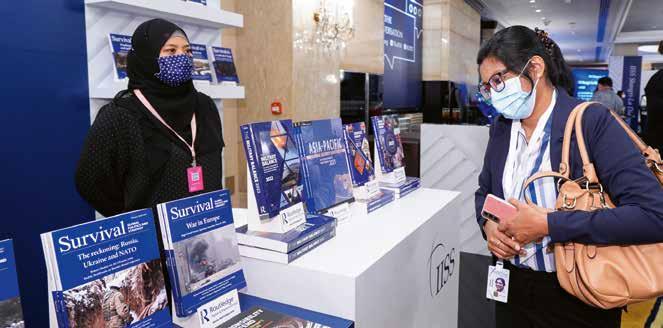
IISS, Russia’s Military Modernisation: An Assessment (London: IISS, 2020).
IISS, Asia-Pacific Regional Security Assessment 2020 (London: IISS, 2020).
IISS, ISR & The Gulf: An Assessment (London: IISS, 2019).
IISS, Iran’s Networks of Influence in the Middle East (London: IISS, 2019).
Survival: Global Politics and Strategy, the Institute’s bimonthly journal, is a leading forum for analysis and debate of international and strategic affairs. Recent articles of interest include:
Nicolas Lippolis and Harry Verhoeven, ‘Politics by Default: China and the Global Governance of Afri-can Debt’, Survival, vol. 64, no. 3, June–July 2022, pp. 153–78.
Pierre Haroche and Martin Quencez, ‘NATO Facing China: Responses and Adaptations’, Survival, vol. 64, no. 3, June–July 2022, pp. 73–86.
Sharinee L. Jagtiani and Sophia Wellek, ‘In the Shadow of Ukraine: India’s Choices and Challenges’, Survival, vol. 64, no. 3, June–July 2022, pp. 29–48.
David C. Gompert, ‘Four Circles: Comprehending the China Challenge’, Survival, vol. 64, no. 2, April–May 2022, pp. 95–110.
Jeongseok Lee, ‘South Korea’s Aircraft Carrier Debate’, Survival, vol. 64, no. 2, April–May 2022, pp. 35–44.
Samir Puri, ‘Land and Sea: The Evolving Great-power Contest in Asia’, Survival, vol. 64, no. 1, February–March 2022, pp. 227–36.
Nien-chung Chang-Liao, ‘Why Have Chinese Diplomats Become So Aggressive?’, Survival, vol. 64, no. 1, February–March 2022, pp. 179–90.
Rahul Roy-Chaudhury and Kate Sullivan de Estrada, ‘India and US FONOPS: Oceans Apart’, Survival, vol. 64, no. 1, February–March 2022, pp. 131–56.
Barnett R. Rubin, ‘Geography Lessons: American Decline and the Challenge of Asia’, Survival, vol. 64, no. 1, February–March 2022, pp. 121–30.
Stacie L. Pettyjohn, ‘War With China: Five Scenarios’, Survival, vol. 64, no. 1, February–March 2022, pp. 57–66.
Robert S. Ross, ‘China Looks at the Korean Peninsula: The “Two Transitions”’, Survival, vol. 63, no. 6, December 2021–January 2022, pp. 129–58.
‘Forum: Back to North Korea’, Survival, vol. 63, no. 6, December 2021–January 2022, pp. 101–25.
François Heisbourg, ‘Euro-Atlantic Security and the China Nexus’, Survival, vol. 63, no. 6, December 2021–January 2022, pp. 45–62.
The Adelphi series is the Institute’s principal contribution to policy-relevant, original academic research. Books published since 2021 include:
Yuka Koshino and Robert Ward, Japan’s Effectiveness as a GeoEconomic Actor: Navigating Great-Power Competition, Adelphi 481–483 (Abingdon: Routledge for the IISS, 2022).
Desmond Ball, Lucie Béraud-Sudreau, Tim Huxley, C. Raja Mohan and Brendan Taylor, Asia’s New Geopolitics: Military Power and Regional Order, Adelphi 478–480 (Abingdon: Routledge for the IISS, 2022).
Bastian Giegerich and Maximilian Terhalle, The Responsibility to Defend: Rethinking Germany’s Strategic Culture, Adelphi 477 (Abingdon: Routledge for the IISS, 2021).
Lucie Béraud-Sudreau, French Arms Exports: The Business of Sovereignty, Adelphi 475–-476 (Abingdon: Routledge for the IISS, 2020).
Brendan Taylor, Dangerous Decade: Taiwan’s Security and Crisis Management, Adelphi 470 (Abingdon: Routledge for the IISS, 2019).
The Military Balance is the Institute’s annual assessment of military capabilities and defence economics worldwide. Region-by-region analyses cover the major military and economic trends and developments affecting security policy and the trade in weapons and other military equipment. Comprehensive tables portray key data on weapons and defence economics. Defence expenditure trends over a ten-year period are also shown.
IISS, The Military Balance 2022 (Abingdon: Routledge for the IISS, 2022).
The Armed Conflict Survey is the Institute’s annual review of political, military and humanitarian trends in current conflicts.
IISS, Armed Conflict Survey 2022 (Abingdon: Routledge for the IISS, 2022).
Strategic Comments is the Institute’s online source of analysis of international security and politico military issues. Articles on South, Southeast and Northeast Asia published in 2021-22 include:
‘The effect of AUKUS on India’s foreign and defence policies’, IISS Strategic Comments, vol. 28, no. 6, March 2022.
‘China’s 2021 orbital-weapon tests’, IISS Strategic Comments, vol. 28 no. 3, February 2022.
‘Relations between China and the Arab Gulf States’, IISS Strategic Comments, vol. 27, no. 38, December 2021.
‘China and strategic competition in a divided Pacific Islands region’, IISS Strategic Comments, vol. 27, no. 37, December 2021.
‘Rising international support for Taiwan’, IISS Strategic Comments, vol., 27, no. 35, December 2021.
‘The economic and security implications of China’s activities in the South China Sea’, IISS Strategic Comments, vol. 27, no. 34, November 2021.
‘The arms race on the Korean Peninsula’, vol. 27, no. 30, IISS Strategic Comments, October 2021.
‘Pakistan’s relations with the US after the fall of Kabul’, IISS Strategic Comments, vol. 27, no. 25, September 2021.
‘The fraught relationship between Canada and China’, IISS Strategic Comments, vol. 27, no. 26, September 2021.
‘The centenary of the Chinese Communist Party’, IISS Strategic Comments, vol. 27, no. 20, August 2021.
‘China’s place on the NATO agenda’, IISS Strategic Comments, vol, 27, no. 17, July 2021
‘Asia’s new generation on pro-democracy protestors’, IISS Strategic Comments, vol. 27, no. 15, July 2021.
‘Trans-Tasman tensions over China’, IISS Strategic Comments, vol. 27, no. 11. May 2021
Strategic Survey is the Institute’s annual review of strategic developments throughout the world. Recent sections of interest include:
‘Taiwan: a front line in the new cold war?’, Strategic Survey 2021 (Abingdon: Routledge for the IISS, 2021).
‘South Korea’s foreign policy: local or global?’, Strategic Survey 2021 (Abingdon: Routledge for the IISS, 2021).
‘India-China border tensions: what are the strategic impli cations for the Indo-Pacific?’, Strategic Survey 2021 (Abingdon: Routledge for the IISS, 2021).
‘The Biden Administration’s South Asia Policy: Change or continuity?’, Strategic Survey 2021 (Abingdon: Routledge for the IISS, 2021).
The IISS Shangri-La Dialogue
The IISS wishes to thank these sponsors of the IISS Shangri-La Dialogue 2022
Since the inception of the IISS Shangri-La Dialogue (SLD) in 2002, this unique experiment in multilateral defence diplomacy has involved defence ministers, deputy ministers, chiefs of defence staff, nationalsecurity advisers, permanent under-secretaries, intelligence chiefs and other national-security and defence officials from a range of participating and guest nations
The result has been the growth of the Shangri-La Dialogue into the richest gathering of defence professionals in the Asia-Pacific. The goal of the IISS is to ensure that the Shangri-La Dialogue will continue to serve as the best available vehicle in the Asia-Pacific for developing and channelling astute and effective public policy on defence and security.
The IISS, a registered charity with offices in London, Berlin, Manama, Singapore and Washington is the world’s leading authority on political–military conflict. It is the primary independent source of accurate, objective information on international strategic issues. Publications include the Asia-Pacific Regional Security Assessment, an annual review of key strategic, geopolitical, economic, military and security trends in the Asia-Pacific; The Military Balance, an annual reference work on each nation’s defence capabilities; Strategic Survey, an annual review of world affairs; Survival: Global Politics and Strategy, a bimonthly journal on international affairs; Strategic Comments, offering online analysis of topical issues in international affairs; and the Adelphi book series, the Institute’s principal contribution to policy-relevant, original academic research.
The range of IISS publications, the Institute’s convening power, and its strong international policy perspective make the IISS a key actor in the global strategic and economic debate.
‘The SLD has provided an open, neutral and regular platform for countries to exchange views on regional security issues, challenges and opportunities, as well as differences.’
Dr Ng Eng Hen, Minister for Defence, Singapore
‘In times of upheaval and tensions, it is precisely forums of this kind that not only serve as a chief register of regional geopolitical temperature, but also spell the difference between collectively espousing a path of diplomacy and peace instead of conflict and confrontation.’
Major-General (Retd) Delfin Lorenzana, former secretary of national defense, the Philippines